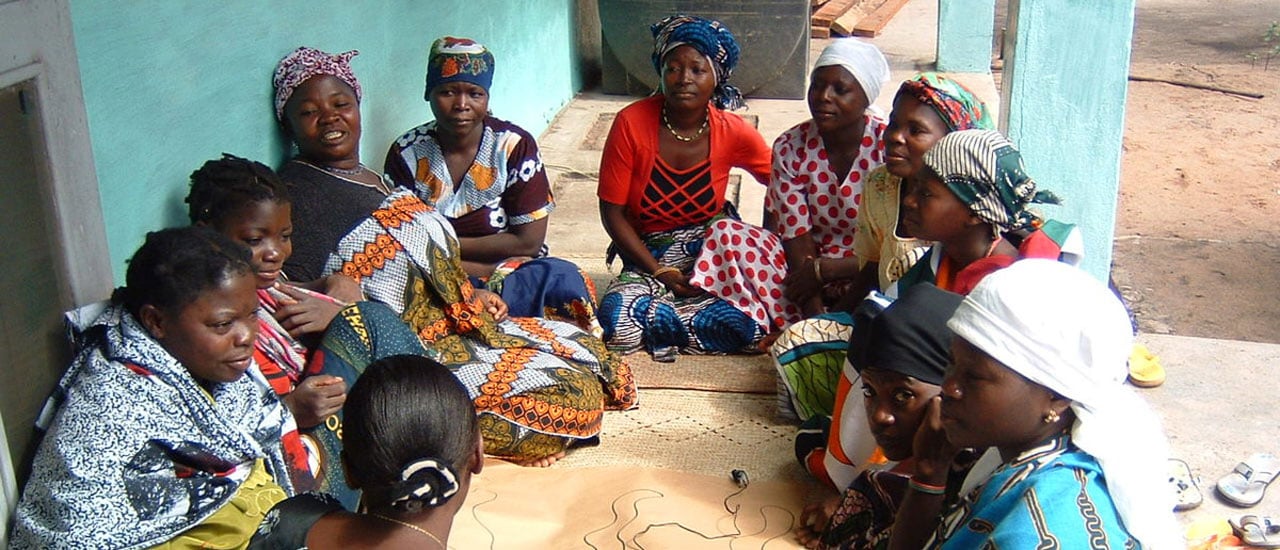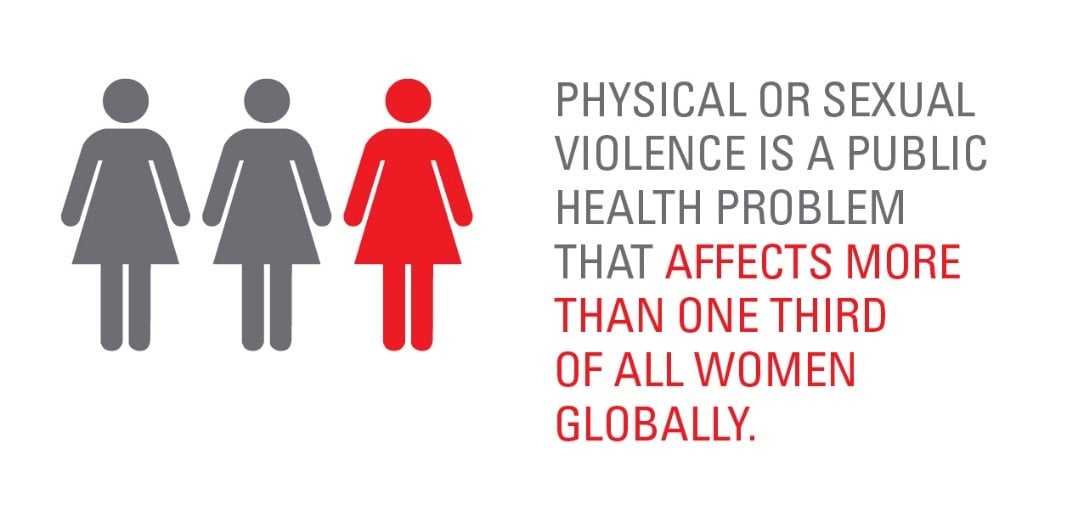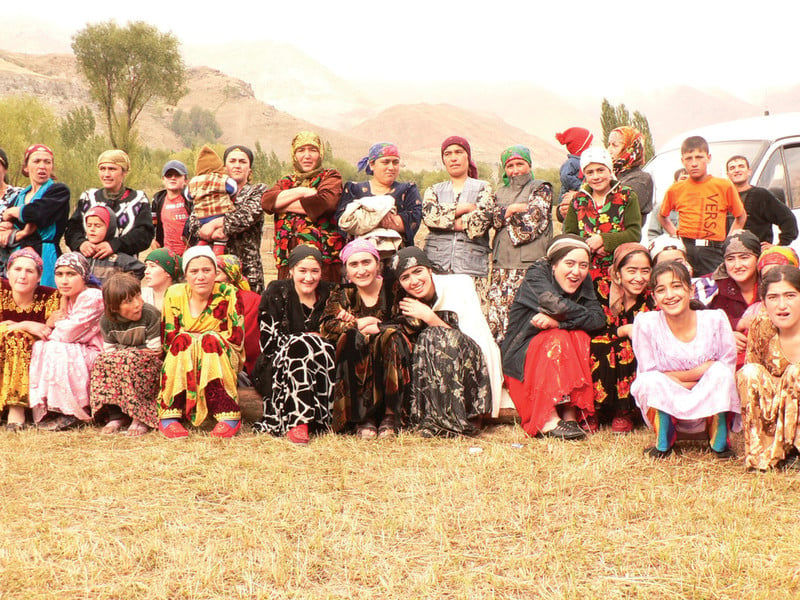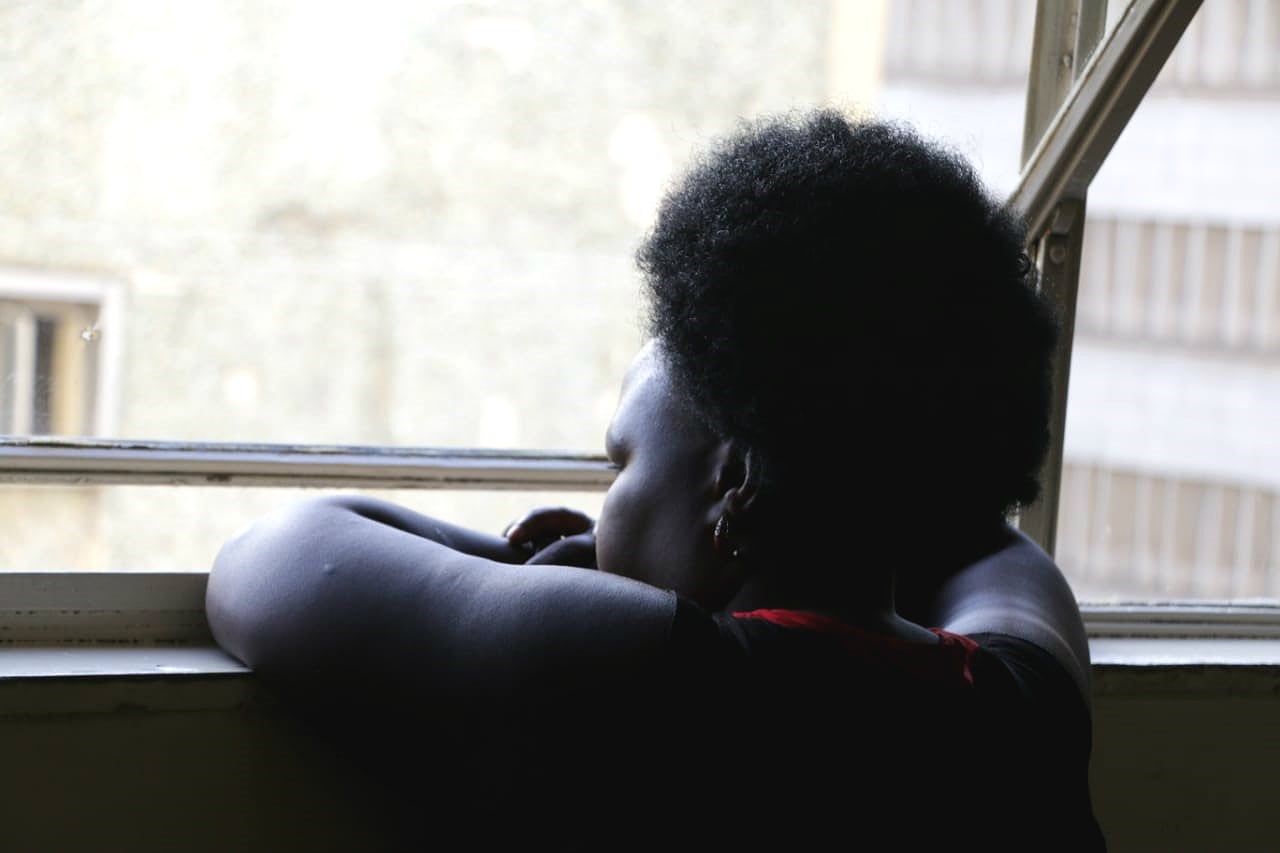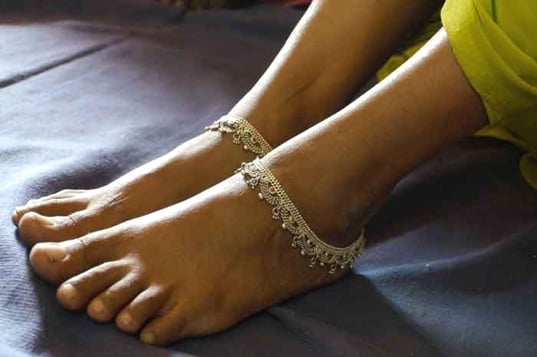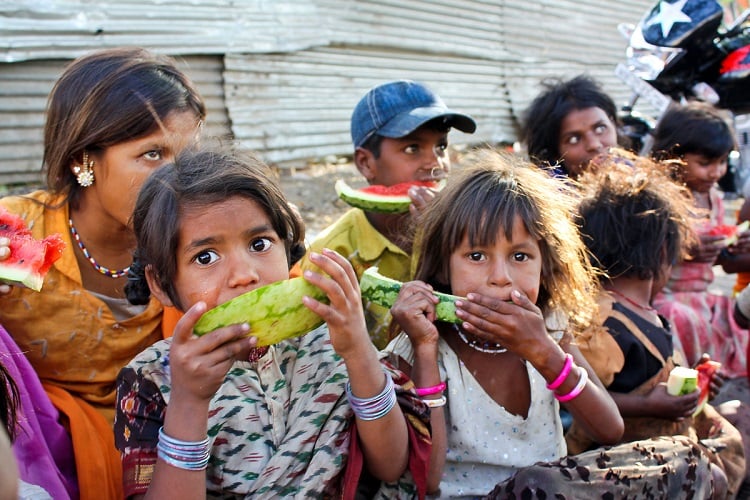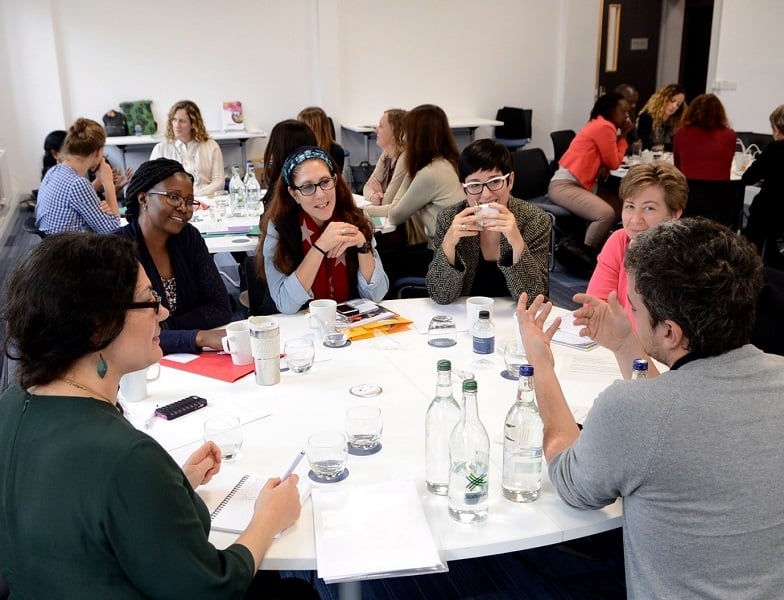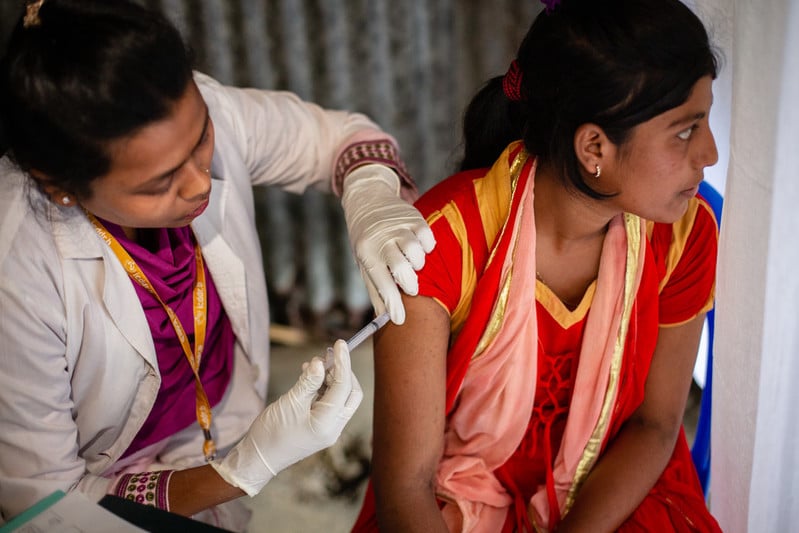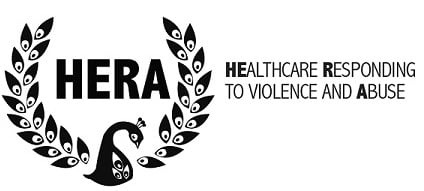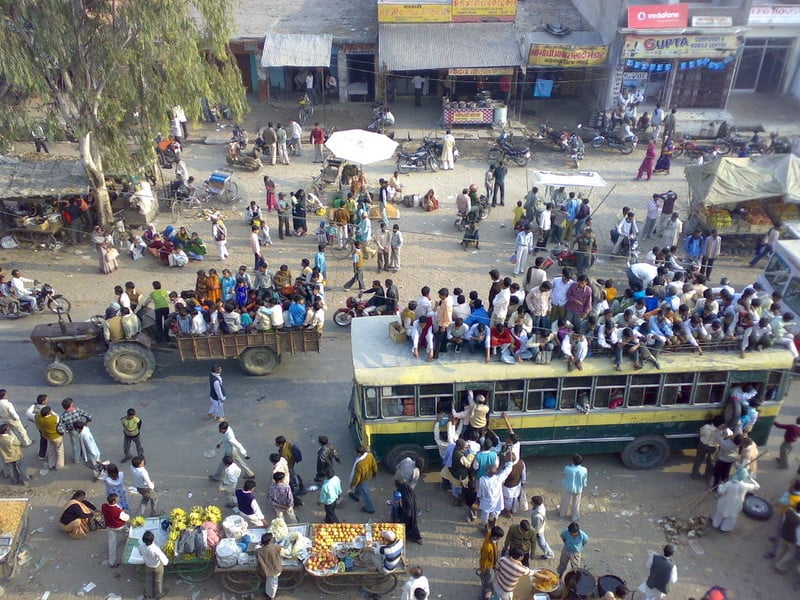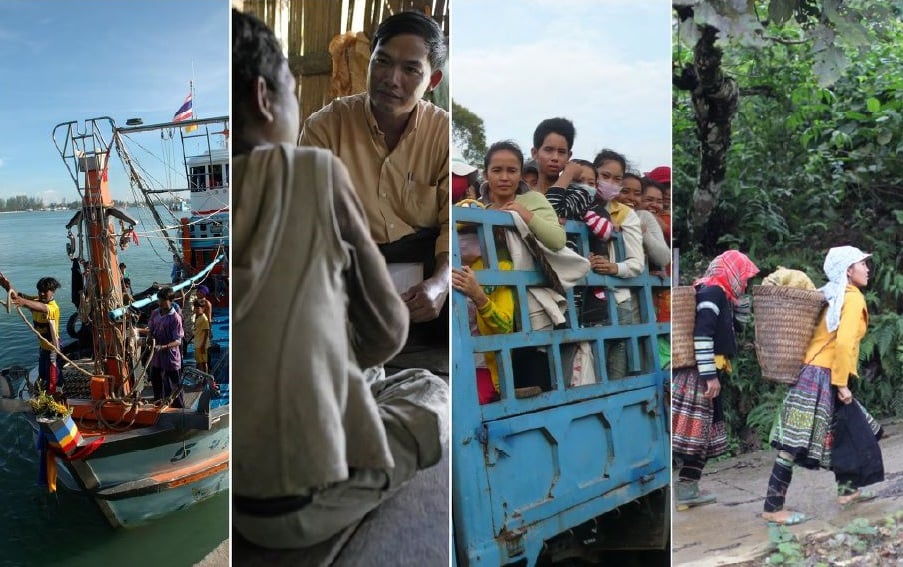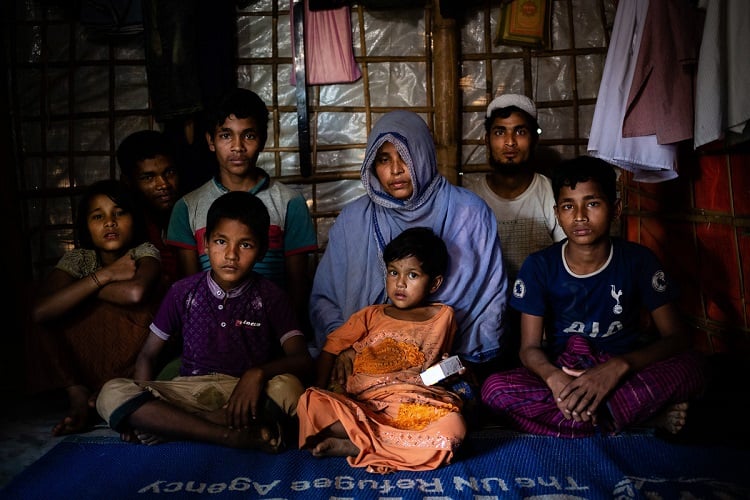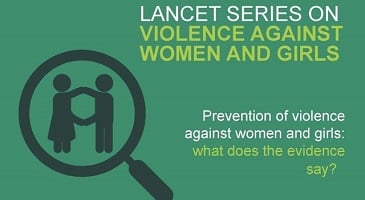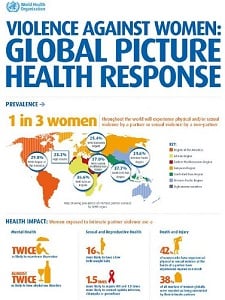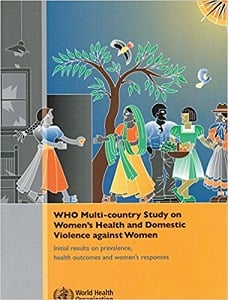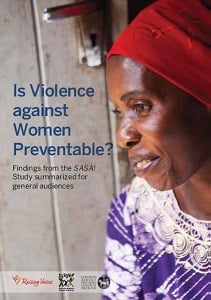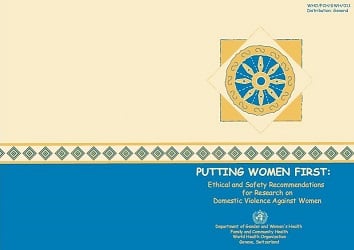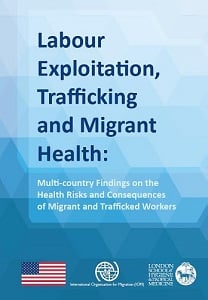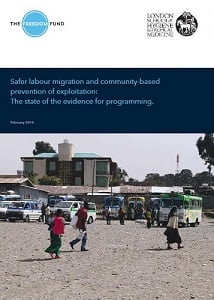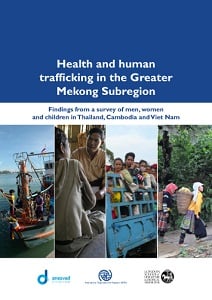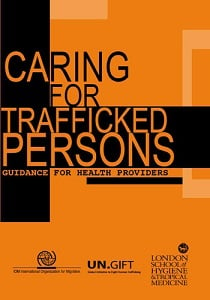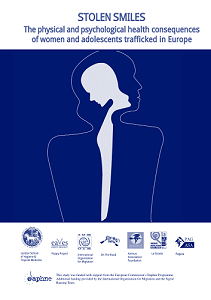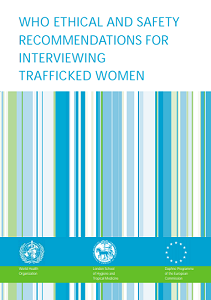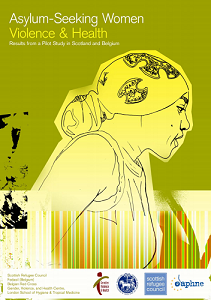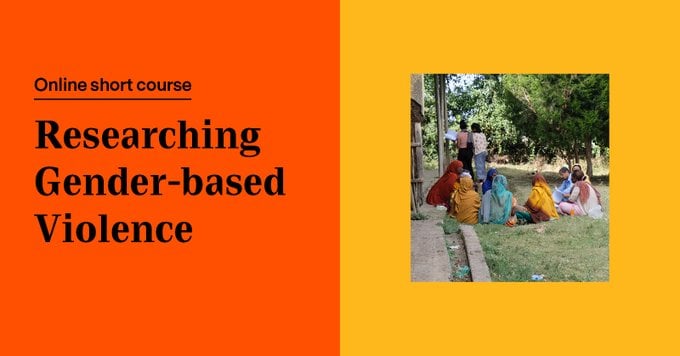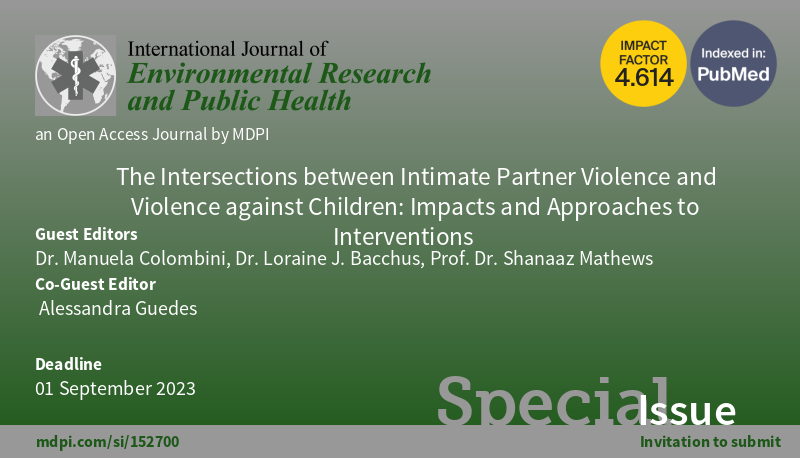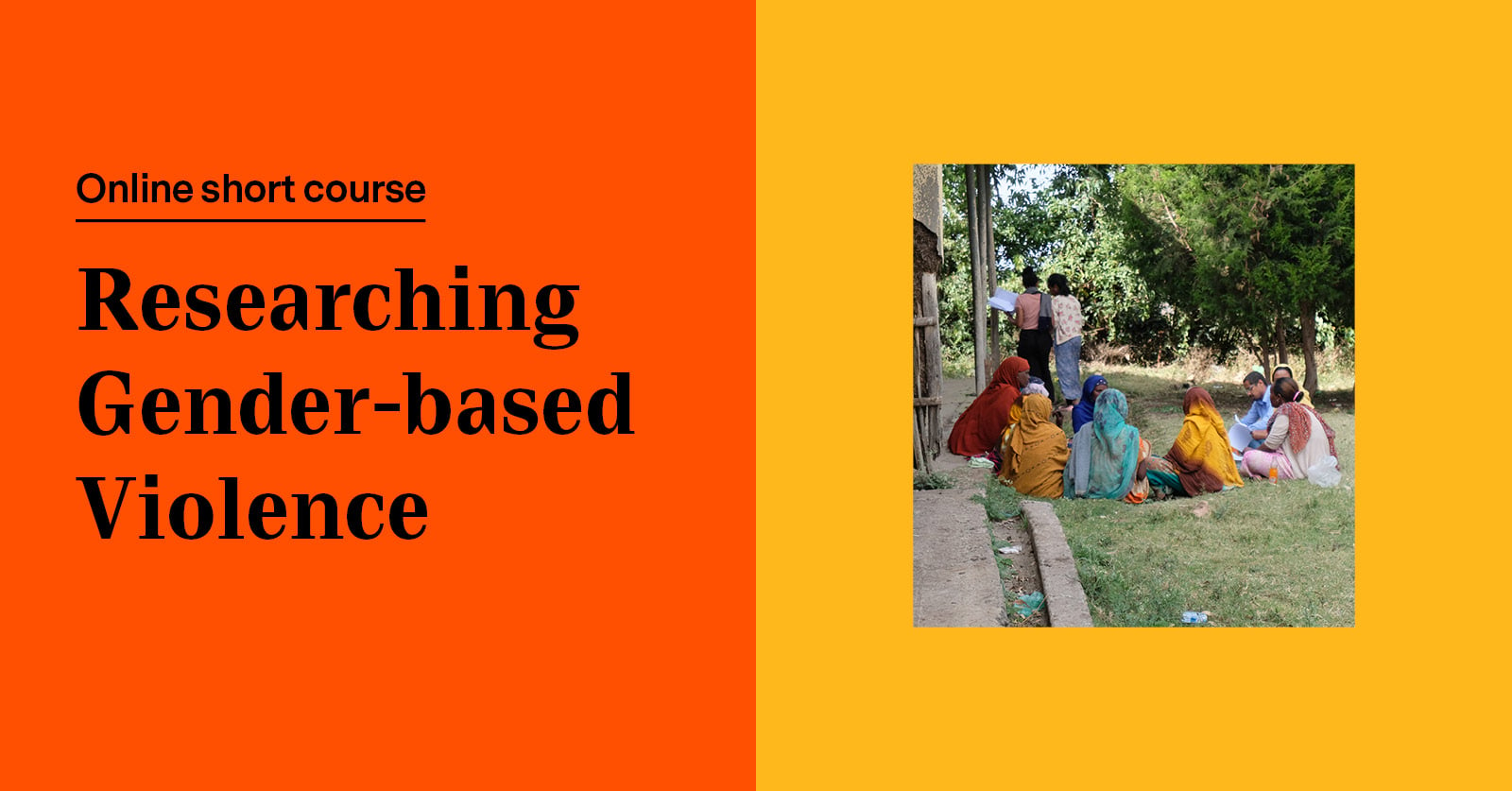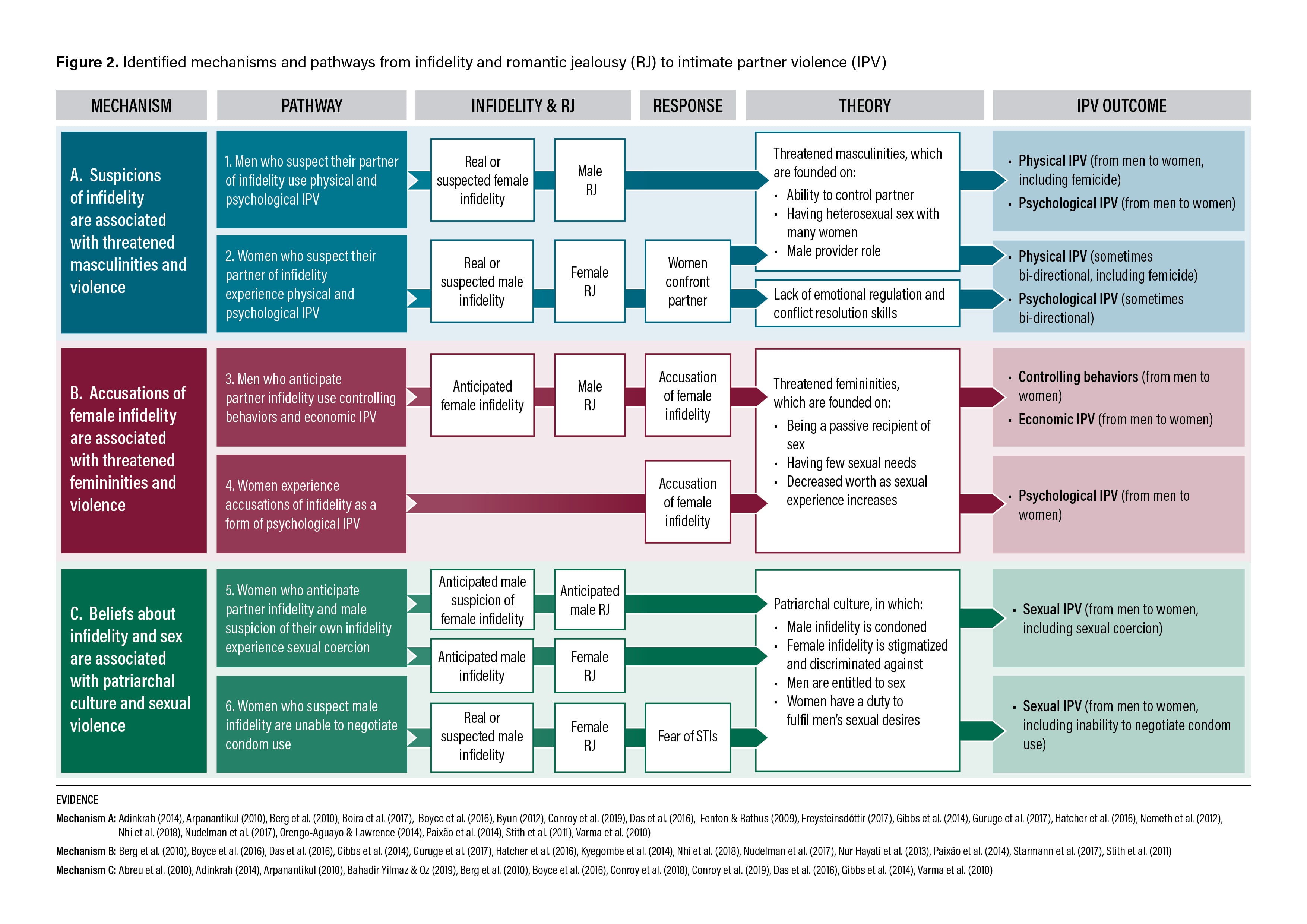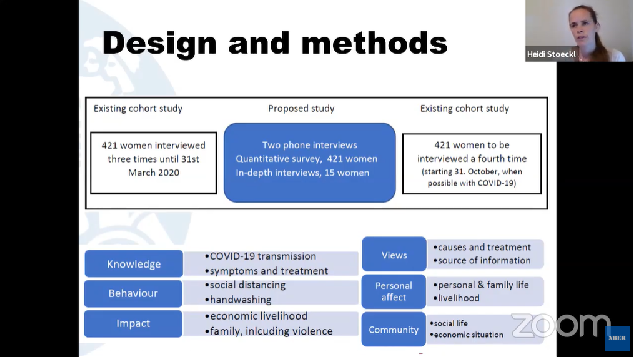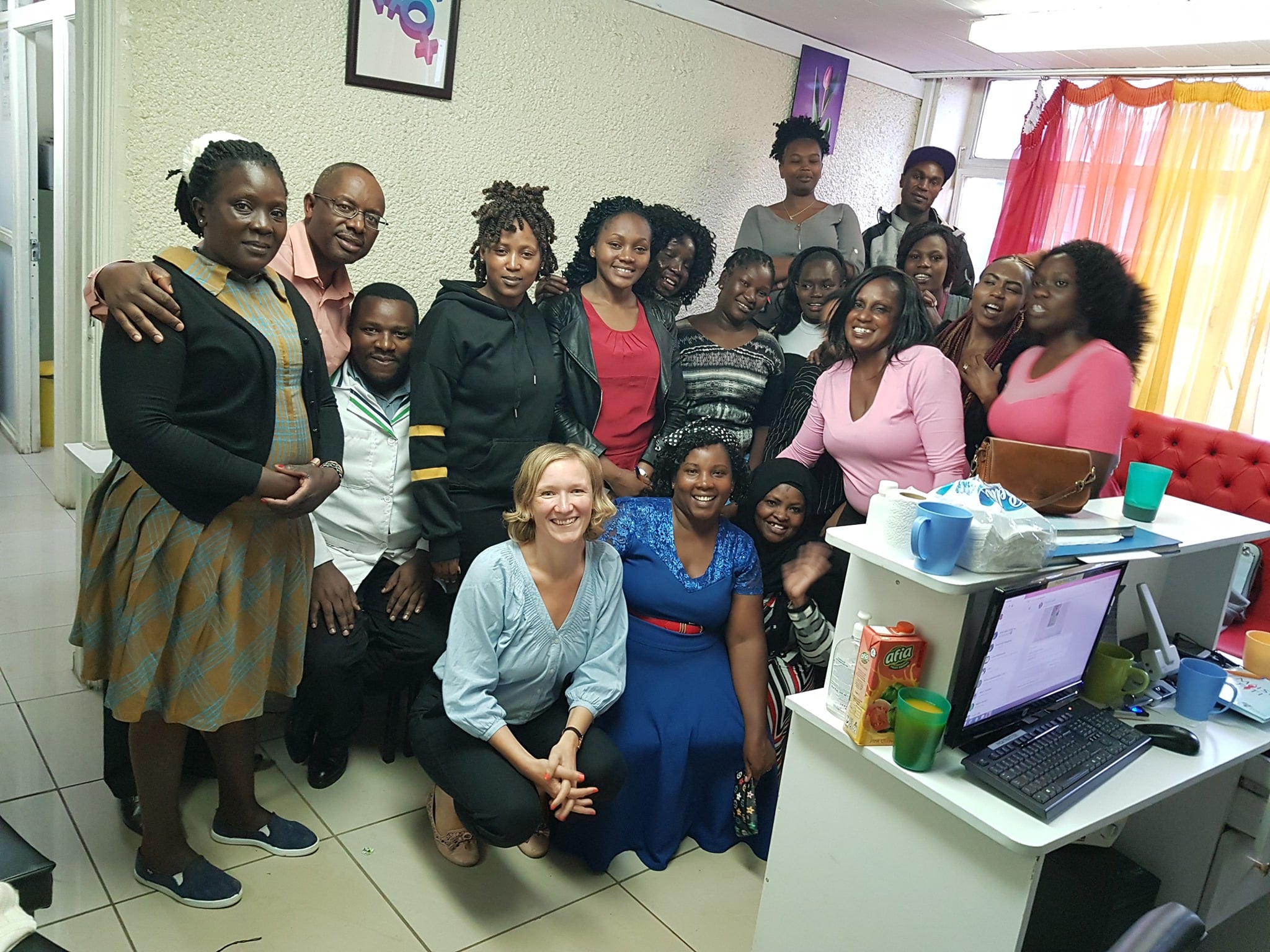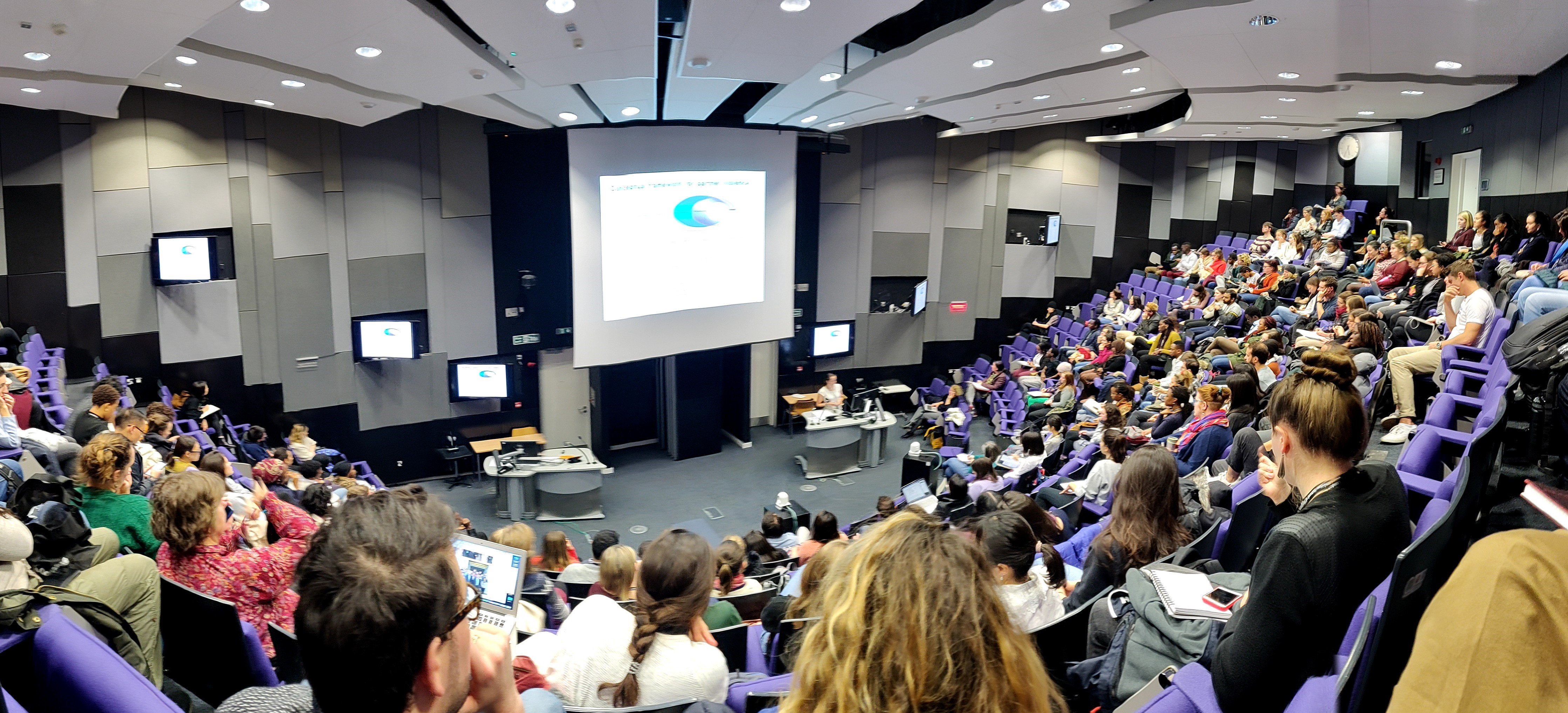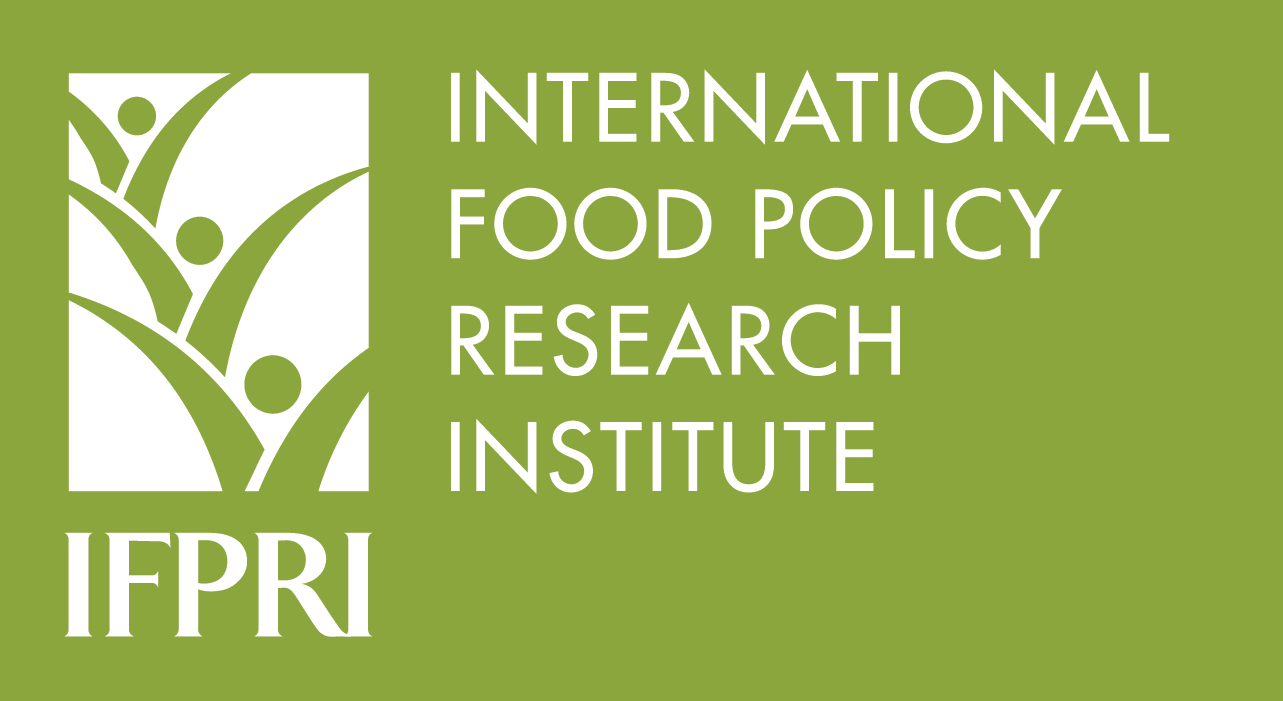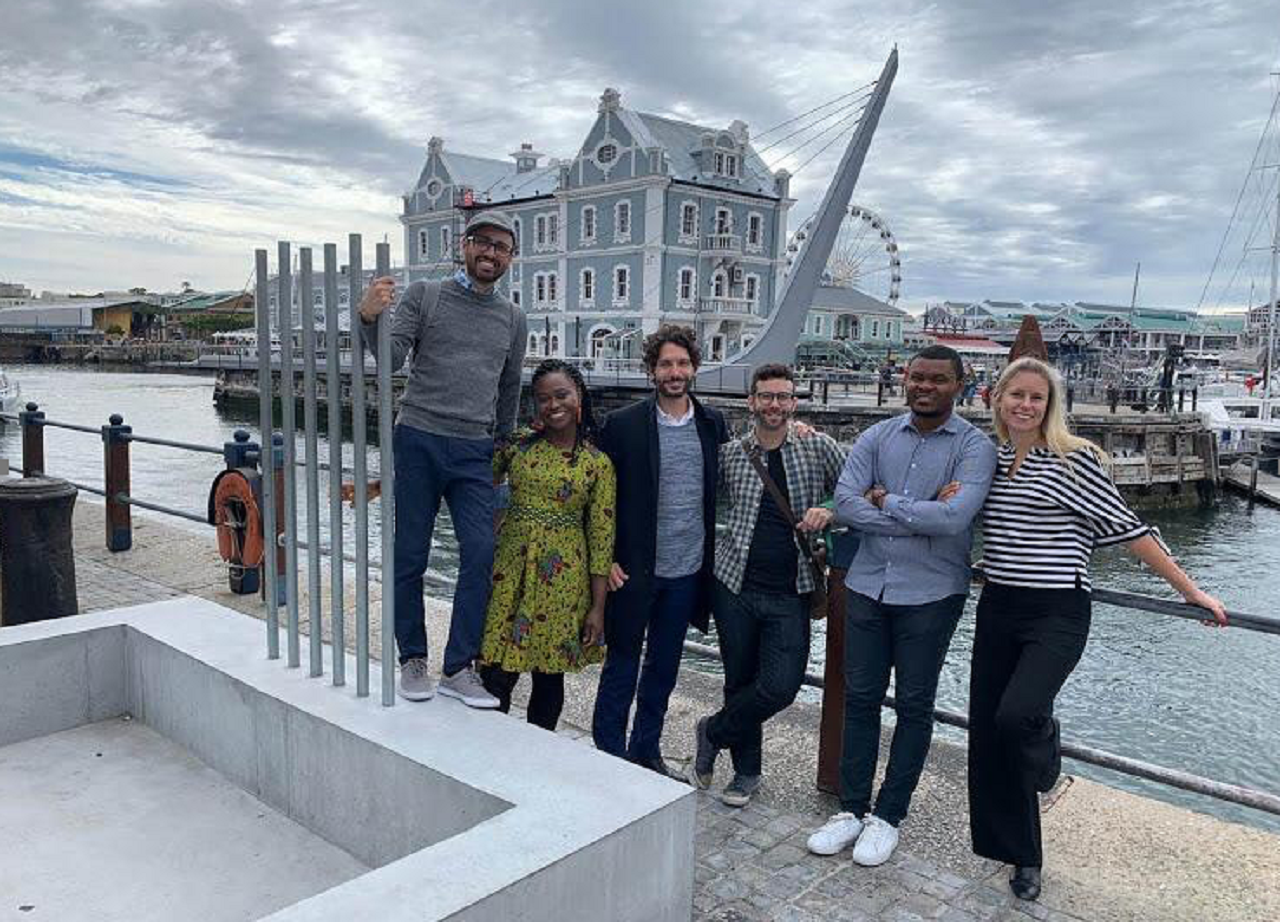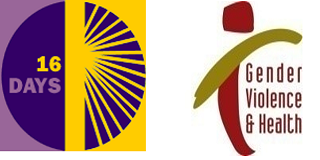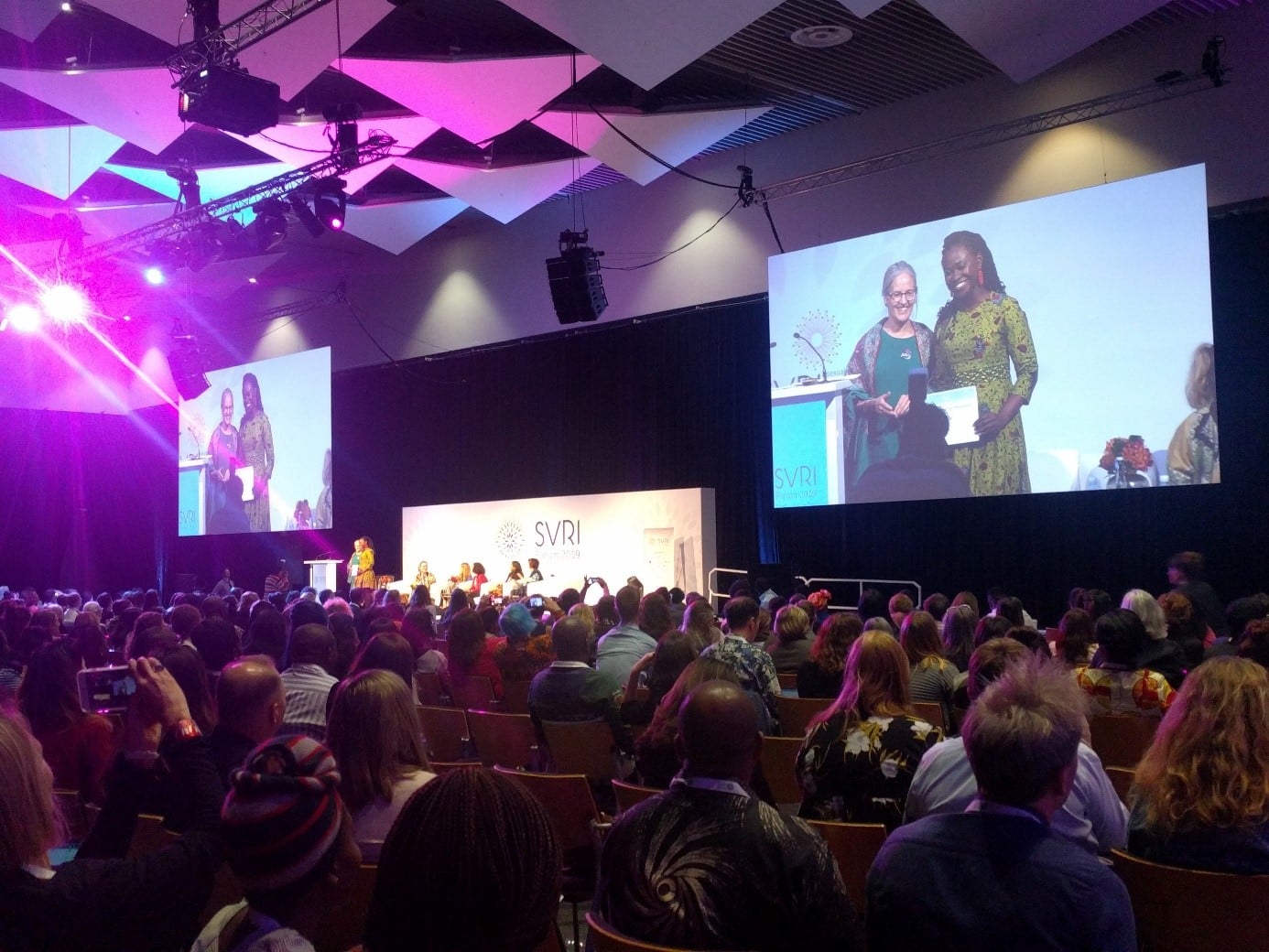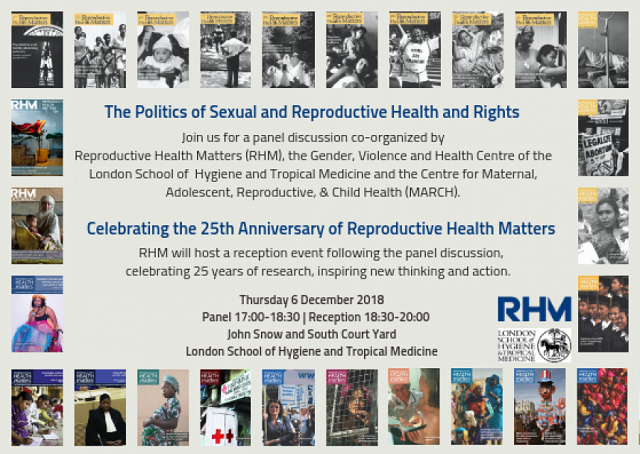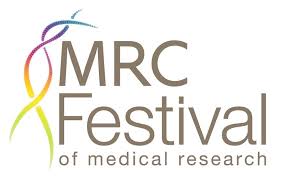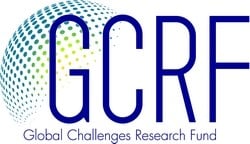Our research is action-oriented. We aim to better understand how to prevent violence and strengthen community and health systems responses to it.
We have been a World Health Organisation Collaborating Centre since 2019.
Find out more about the major themes covered by our research including:
- Violence against women
- Violence against children
- Migration, human trafficking and labour exploitation
Read about our current and completed projects such as:
- CoVAC - a longitudinal study examining the effects of experiences of violence in Ugandan adolescents.
- HERA - understanding how healthcare systems can integrate interventions for violence against women.
- LINEA - testing how social norms can be used to reduce the sexual exploitation of children and adolescents.
- MAISHA - a trial preventing violence against women in Tanzania.
The Gender Violence and Health Centre (GVHC) is a multi-disciplinary group dedicated to research on the extent, causes, consequences and prevention of gender-based violence.
We work closely with local, national and international partners and stakeholders around the world to improve the lives of women, men, adolescents and children by:
- identifying pressing research needs
- conducting action-oriented research
- and generating scientific knowledge and evidence on gender-based violence and health.
View our history of GVHC video.
Our strategic goals
- 1. Going deeper: advancing theories and understanding determinants, causal pathways and prevention mechanisms related to gender-based violence
-
To make substantial advances in reducing gender-based violence globally, we need stronger theoretical development and greater understanding of the mechanisms that influence violence.
Over the next three to five years, we are committed to synthesising current knowledge, developing robust, cross-disciplinary methods, and actively engaging with academic and non-academic collaborators, especially researchers in low- and middle-income countries.
We will:
- utilise multiple data sets to understand differences across age groups, gender, vulnerable sub-populations, regions, and countries.
- examine evidence from trials and programme evaluations to consolidate lessons and inform specialised longitudinal studies. With a focus on different types of violence and incorporating questions on violence in current surveillance surveys.
- draw on our history of developing and applying research ethics for violence studies, to ensure our upcoming work leads the field in safe and sensitive ethical and safety protocols.
- 2. Going wider: developing interventions and conducting rigorous evaluations
-
Growing acknowledgement of the high prevalence of gender-based violence has led to an increased investment in trying to understand what works to address it. Yet, to date, we still lack robust knowledge on what works in different settings.
As a global leader in evaluation of interventions to prevent violence against women, girls and children, The Gender Violence & Health Centre aims to expand this core competency to advance methodological approaches to inform intervention development, conduct impact studies and to support scale up of effective interventions.
We will:
- conduct ground breaking formative research to explore approaches to intervention development and adaptation, including identifying key intervention components and exploring multi-component intervention options.
- translate consolidated and emerging knowledge into intervention development and consider how evidence from interventions might be adapted to different settings.
- provide robust economic costings of interventions and evidence of value for money.
- identify scale-up opportunities of promising interventions that need to be further developed or adapted to reach larger populations.
- identify and characterise scale up pathways for different intervention models, including multi-sector intervention delivery models.
- 3. Going beyond silos: transcending boundaries in work on violence against women, adolescents and children
-
There is increasing recognition of the interconnections between violence against women and violence against children, and the overlaps with the field of human trafficking and labour exploitation. The Gender Violence and Health Centre is committed to bridging these silos. As always, our work depends on our wide-ranging partnerships (e.g. international organisations, NGOs, national and local governments, local stakeholders, male, female, and young community members).
We will work across:
- populations (e.g. women, men, adolescents, children),
- themes (e.g. physical and sexual violence, emotional abuse, sexual harassment),
- disciplines (e.g. anthropology, epidemiology, economics, political science, sociology),
- and settings (e.g. urban, rural, countries, continents).
Where we work
Gender-based violence is a global issue, and the international scope of our work reflects this. We work in collaboration with partners all over the world, with an emphasis on low- and middle-income countries. Members of the Gender Violence and Health Centre have also led pioneering research into violence against women in conflict affected regions, and among mobile populations.
Our current and past projects are based around the world: Argentina, Bangladesh, Brazil, Cambodia, China, Cote d'Ivoire, Ecuador, Ethiopia, Germany, India, Italy, Kazakhstan, Kenya, Laos, Malawi, Malaysia, Mali, Myanmar, Nepal, Nigeria, Palestine, Peru, Romania, Spain, South Africa, Sri Lanka, Tanzania, Thailand, Turkey, Uganda, UK, Ukraine, USA, Vietnam, and Zimbabwe.
As well as leading projects in individual countries, we have collaborated in major multi-country studies to estimate global prevalence and impacts of intimate partner violence, intimate partner homicide, and child sexual abuse, and to help understand what drives variation in levels of violence around the world.
Directors and founders
 Manuela Colombini CO-DIRECTOR, Associate Professor in Health Systems and Policy |
Nambusi Kyegombe |  Meghna Ranganathan CO-DIRECTOR, Associate Professor |
Charlotte Watts |
Lori Heise |
Cathy Zimmerman |
 Ana Maria Buller FORMER DIRECTOR, Associate Professor in Social Sciences |
Heidi Stöckl |
Researchers
Tanya Abramsky |
Loraine Bacchus |
Tara Beattie |
Amiya Bhatia |
Rose Burns |
Beniamino Cislaghi |
Karen Devries |
Anna Foss | Mitzy Gafos |
|
Annabelle Gourlay |
Shaffa Hameed |
Sheila Harvey |
Shelley Lees |
Michelle Lokot | Joelle Mak |
Mark Marchant |
Mahesh Mathpati |
Jodie Pearlman |
|
Marjorie Pichon |
Clare Tanton |
Nerissa Tilouche |
Sergio Torres Rueda |
Anna Vassal |
Anja Zinke-Allmang |
Support staff
Rosa Arques Victoria Dela Luna |
PhD students
|
|
Devika Gupta |
|
Mwansa Njelesani |
Marie Nodzenski | |
|
| |
Philomena Raftery |
|
Tanya Wells Brown
|
Dan Biswas Lily Haritu Foglabenchi Susan Kelly Jihana Mottley |
Former members
Camilla Fabbri | Giulia Ferrari |
Lottie Howard-Merrill |
Ligia Kiss | Louise Knight |
Sian Oram |
Nicola Pocock |
Holly Prudden |
Michelle Remme |
Erin Stern |
Established to tackle violence against women and girls, the Gender Violence and Health Centre was instrumental in bringing the problem of violence against women to global attention.
While this is still a core focus of our work, our scope has expanded to include a growing number of projects on violence against children and adolescents. The Gender Violence and Health Centre members also conducted one of the first surveys to estimate prevalence of intimate partner violence against men in same-sex relationships, and have led major studies into human trafficking and labour exploitation.
At the core of all of our work is an understanding of the importance of social norms and power imbalances in perpetuating and creating vulnerabilities to violence. Our action-oriented research aims to equip policy makers, practitioners and activists with the evidence they need to create lasting social change.
Our major themes
- Extent, causes, and consequences of violence against women
-
The Gender Violence and Health Centre has been instrumental in bringing the problem of violence against women to global attention, from its role in early high profile studies such as the WHO Multi-country study on Women’s Health and Domestic Violence, through to the Global Burden Study to document the global prevalence of intimate partner violence. By documenting the extent of Violence against Women, and the physical, mental, social and economic consequences that it has for women, their families, communities and society as a whole, we increase the imperative of the global community to act – both to prevent violence and to respond more effectively to those affected.
Key to preventing violence is an understanding of what causes it. The Ecological Framework developed by Dr Lori Heise, member and former-Director of the Gender Violence and Health Centre, is now widely used by violence researchers, activists and policy makers around the world to acknowledge the different levels at which risk factors for intimate partner violence operate – individual woman, individual man, relationship, community and society. While our research focuses on all of these levels and the interactions between them, a strong focus of much of our current work is on community and societal (or ‘structural’) level factors that drive intimate partner violence risk. These include gender norms and women’s lack of access to education and economic opportunities.
Links between violence against women and HIV are also a major focus of the Centre. Intimate partner violence can be both a cause and consequence of HIV infection, and the two often share common underlying risk factors (such as notions of manhood that condone both men’s power over women and men engaging in risky sexual behaviours).
Our projects use diverse methods, from large-scale multi-country population-based surveys allowing us to make comparisons between settings, through to longitudinal studies that allow us to look at trajectories of risk over time and better disentangle causes versus consequences of intimate partner violence.
- Prevention of violence against women
-
The Gender Violence and Health Centre is at the forefront of research on the prevention of violence against women and is a member of the research consortium implementing the DFID ‘What Works to Prevent Violence’ Global Programme.
Despite recognition of the extent of violence against women and its severe consequences for women around the world, rigorous evidence on what works to prevent violence against women is scarce. The Gender Violence and Health Centre has led some of the first cluster randomised trials of violence against women prevention programmes in low and middle income countries. We have evaluated a broad range of violence against women interventions, including those aiming to empower women socially and economically, those working with men to promote ‘positive masculinities’, and those seeking to mobilise entire communities to challenge the underlying norms and structures that drive high rates of violence against women and girls. We are also interested in the potential for violence against women prevention programmes to impact on other forms of violence such as violence against children, and in how to integrate violence against women and HIV prevention efforts.
A growing evidence base demonstrates that cash transfers have potential to reduce intimate partner violence. Members of the Gender Violence and Health Centre have led qualitative studies to understand the pathways of influence of cash transfers on intimate partner violence and conducted the first review of rigorous studies from low-and middle-income countries, demonstrating that cash transfers decrease intimate partner violence.
The Gender Violence and Health Centre is involved in all stages of the evaluation process, from formative research around the development and adaptation of intervention approaches and content, through to impact evaluations and research into the adaptation and scale-up of promising intervention models. Economists within our team also work closely alongside epidemiologists and social researchers to cost interventions, a key consideration of policy-makers tasked with deciding which interventions to adopt on a wider scale.
For more information on cash transfers and IPV contact Dr Ana Maria Buller, Dr Meghna Ranganathan, Dr Shelley Lees and Dr Nambusi Kyegombe.
- Violence against sex workers
-
Women who sell sex are at increased risk of violence compared with women in the general population. Recent estimates suggest that between 45% and 75% of female sex workers (FSWs) will experience violence in their lifetime, with between 32% and 56% reporting violence in the past year (Deering AJPH 2014).
As well as experiencing violence from their intimate partners, women who sell sex face violence from a host of other perpetrators, including clients, pimps, madams, the police, other sex workers, strangers and goons/thugs. Women face emotional abuse, physical and sexual violence, financial violence and police extortion, illegal police arrest and incarceration. In most settings, the illegal/unclear legal status of sex work means that women who experience violence rarely report this to the authorities and men who perpetrate violence are rarely bought to justice, enabling them to continue re-offending with impunity (Dunkle AJRI 2012).
FSWs are also at greatly increased risk of HIV infection compared with women in the general population (Baral Lancet Infect Dis 2012). There is good evidence from longitudinal cohort studies that women who experience violence are at increased risk of HIV infection (Li JIAS 2014), and this is also true of FSWs. Among women living with HIV, violence also impacts on HIV outcomes, including reducing uptake and adherence of HIV anti-retroviral (ARV) medicines (Hatcher AIDS 2015).
At LSHTM we have a long history of working with collaborators in India, Kenya and Canada on issues of violence and HIV with female sex worker populations in low- and middle-income countries.
The 10-year Bill and Melinda Gates funded India Avahan programme, found peer-led comprehensive violence and HIV prevention programming was associated with reductions in both violence and HIV among FSWs.
- Violence against female sex workers in Karnataka state, south India: impact on health, and reductions in violence following an intervention program
- Declines in violence and police arrest among female sex workers in Karnataka state, south India, following a comprehensive HIV prevention programme
The 7-year MRC-DFID funded Samvedana Plus intervention, has been working in partnership with Karnataka Health Promotion Trust, south India, to reduce violence against FSWs by their intimate partner.
- Reducing violence and increasing condom use in the intimate partnerships of female sex workers: study protocol for Samvedana Plus, a cluster randomised controlled trial in Karnataka state, south India
- Understanding the Relationship Between Female Sex Workers and Their Intimate Partners: Lessons and Initial Findings From Participatory Research in North Karnataka, South India
The 3-year MRC-DFID funded Maisha Fiti study in Nairobi, Kenya, is working in partnership with Partners for Health and Development in Africa, and aims to understand the indirect pathways by which violence experience increases HIV risk and the impact of violence and other social factors on ARV uptake and adherence.
For more information on GVHC research on violence against sex workers, contact Dr Tara Beattie.
- Violence against children and adolescents
-
Violence against children occurs in all societies throughout the world. In 2016 it was estimated that half of all children aged 2-17 years – that is 1 billion children –had experienced emotional, physical or sexual violence in the past year. All too often this violence is carried out by someone the child knows: family members, teachers, schoolmates, boyfriends and employers.
The consequences of this violence can be profound and long-term, affecting children’s physical, psychological and mental health. Children who experience violence are also more likely to perpetrate violence against others later in life, perpetuating cycles of violence in future generations.
The Child Protection Research Group led by Prof Karen Devries is part of the Gender Violence & Health Centre. This research group includes several Gender Violence & Health Centre members and works with partners in low and middle income countries, to better understand the causes and consequences of violence against children, and to develop and evaluate interventions to reduce this violence.
Much of the work of the Child Protection Research Group is focused on the primary prevention of violence. They have led major studies on the development and evaluation of school-based violence prevention strategies, as well as research into community based prevention programming. They also conduct research with children and adolescents identified as high risk or already receiving child protection services, to study resilience and explore how to improve health outcomes among those who have experienced violence.
The Child Protection Research Group uses a range of epidemiological and social research methods, including randomised controlled trials, cross-sectional and cohort studies, qualitative research, evidence synthesis and modelling. They also undertake methodological research into the ethical conduct of child protection research, how to ensure children and adolescents are able to disclose their experiences to researchers, and how to measure experience and use of different forms of violence in different settings.
The Gender Violence and Health Centre benefits from a close relationship – and the exchange of skills, knowledge and ideas – with the Child Protection Research Group. The Learning Initiative on Norms, Exploitation and Abuse (LINEA) was established within the Gender Violence & Health Centre in 2014. This international multi-pronged project explores how social norms theory can be used to prevent the sexual abuse and exploitation of children and adolescents across the world.
An additional focus of the Gender Violence and Health Centre is the intersections between violence against women and violence against children. Areas of interest include the co-occurrence of violence against women and violence against children within households, intimate partner violence and non-partner sexual violence against adolescent girls, the effects that witnessing intimate partner violence have on children’s well-being and future risk of perpetrating/experiencing intimate partner violence, and the potential for violence against women interventions to impact on children’s well-being.
For more information on social norms and sexual exploitation of children and adolescents contact Dr Ana Maria Buller and Ms Lottie Howard-Merrill.
- Intimate partner violence against men in same sex relationships
-
Research suggests that at least a third of men in same sex relationships have experienced violence by an intimate partner. Studies from the US indicate that among some populations this figure may be upwards of 75%. And yet, intimate partner violence against men in same sex relationships remains a largely hidden problem.
As with women, the effects of IPV on men’s health and behaviours can be serious and far-reaching. They include increased depressive symptoms, substance abuse, unprotected sex and HIV infection. However, whilst there is a growing body of evidence on health systems interventions for women who experience domestic violence, there is sparse research on the needs of men in same sex relationships, or interventions that may address the specific situations and challenges faced by them.
Men are often reluctant to seek help from services due to the dual stigma of being gay and suffering abuse from a same sex partner. Internalised gender notions about masculine identity may cause men to be silent about their experiences. The heteronormative frameworks within which health system interventions for domestic violence are developed pose an additional barrier to help seeking. Furthermore, bidirectional violence is common within this population, meaning it can be difficult to distinguish ‘victim’ from ‘perpetrator’.
Dr Loraine Bacchus was Principal Investigator on the first UK study (PROVIDE) to explore experiences of domestic violence and associated health problems among gay and bisexual men attending sexual health services, as part of an NIHR programme grant on health sector responses to domestic violence. The research also pilot tested an intervention to help sexual health practitioners identify, support and provide appropriate referrals for men in same sex relationships who are experiencing domestic violence.
Within the context of PROVIDE GVHC Deputy Director Dr Ana Maria Buller, led the first global systematic review on the health outcomes of IPV among MSM which found that MSM who have experienced IPV are more like to be HIV positive, show signs of mental health illness and substance abuse among other detrimental health outcomes.
For further details contact Dr Loraine Bacchus and Dr Ana Maria Buller.
- Health systems and service responses to violence
-
Health systems have a crucial role in responding to violence against women as part of a coordinated multi-sector response. Women access health services at multiple points – from primary care and hospital settings through to sexual and reproductive health clinics and HIV services. This provides opportunities for those experiencing violence against women to access support, but health services are often slow to recognise violence, have limited resources, and lack staff trained in how to help. The Gender Violence and Health Centre conducts research into how best to integrate violence against women interventions into health systems and services.
While existing evidence on health systems responses to violence against women is skewed towards high income countries, the Gender Violence and Health Centre research spans low-, middle- and high-income countries. We have conducted studies in Europe, the Middle East, Asia, sub- Saharan Africa, Latin America and North America. Our work draws on a variety of disciplines including health services research, health systems and policy analysis, social science and economics.
The Gender Violence and Health Centre researchers have undertaken health policy and systems research evaluations of a wide variety of intervention models, including:
- One Stop Crisis Centres in Asia;
- integration of intimate partner violence screening/services into primary care, sexual and reproductive health and HIV settings in a range of LMIC countries;
- incorporation of an mHealth intimate partner violence intervention into nurse home visitation programmes in the US;
- responses to intimate partner violence in antenatal care settings (in both LMIC and HIC).
Our focus extends beyond the evaluation of specific intervention models. Bigger picture questions have included: how to engage key stakeholders in intervention development and evaluation, how to create links between healthcare systems in low- and middle-income countries and community organisations working on violence against women, and identifying opportunities for coordinated responses to intimate partner violence and child maltreatment. Insights from these have helped us to achieve greater influence on policy and programming, and ultimately ensure better outcomes for women and children.
An innovative multi-country health system and service response project is the NIHR Global Health Group on Healthcare Responding to Violence and Abuse (HERA) in low- and middle-income countries, co directed by Dr Loraine Bacchus with the University of Bristol.
We explore the theoretical underpinnings of how these interventions work, as well as the systems and service factors that may affect their implementation in diverse countries and health settings. Furthermore, we conduct comparative research into promising intervention models, and estimate the relative costs of different health sector interventions.
For more information on the Gender Violence and Health Centre research on health systems responses to violence against women, contact Dr Loraine Bacchus or Dr Manuela Colombini.
- Migration, human trafficking and labour exploitation
-
We live in an increasingly globalised world. The latest figures suggest that there are approximately one billion people on the move – 258 million international migrants and about 750 million people who have migrated within their own country. While migration can bring many benefits for individuals, their families and communities of origin and destination, it can also put migrants at risk of abuse, exploitation and adverse health outcomes. The Gender Violence and Health Centre leads pioneering research into the health and well-being of vulnerable mobile groups, including trafficked persons, low-wage migrant workers, refugees and asylum-seekers.
The Gender Violence and Health Centre has been a key player in highlighting the links between trafficking and health. European based studies led by Prof Cathy Zimmerman, a founding member of the Gender Violence & Health Centre, generated the first data on the health risks and outcomes associated with trafficking, while the STEAM study in the Mekong region remains the largest study to date on human trafficking and health.
Our research goes beyond highlighting risks – it is tailored to influence programming and policy and to ultimately improve the lives of migrants. To this end, we have conducted a major evaluation of a multi-country programme to prevent forced labour (SWIFT), developed a migration policy-making framework, engaged heavily with policy makers to ensure effective research uptake, and produced guidance for health care providers on responding to the health needs of trafficked persons.
The Gender Violence and Health Centre work focuses on all stages of the migration process, identifying both the risks and intervention opportunities that can occur at each stage – from pre-departure planning and travel, through to arrival and life at destination, and (in some instances) return to the country of origin. We use mixed methods, quantitative and qualitative, to help understand the complexity of the migration process and diversity of migrants’ experiences.
The Gender Violence and Health Centre has led projects in Asia, Africa, South America and Europe (including the UK). Many of these are multi-country studies, reflecting regional migration flows and challenges.
Our work focuses on the gendered aspects of migration, trafficking and exploitation, recognising the particular vulnerability of women and children to sexual abuse and exploitation, and the experiences of men and boys in situations of hazardous and forced labour.
For more information on the Gender Violence and Health Centre research on migration, human trafficking and labour exploitation, contact Prof Cathy Zimmerman, Dr Ligia Kiss, Dr Nicola Pocock, Ms Alys McAlpine, Dr Ana Maria Buller, Dr Heidi Stöckl and Ms Camilla Fabbri.
- Social norms, gender and child protection
-
We envision a world where children, women and men take care of each other with compassion and kindness. To contribute to that vision, our mission is to (1) increase visibility of what children and women hope in their lives, and (2) examine the extent to which global health efforts help or hamper the achievement of those hopes. Specifically, our research team studies how gender and social norms affect people’s lives in global health and international development. We use social norms theory to both look at how norms affect people’s community practices (for example, child marriage, FGM/C, intimate partner violence, use of contraceptive) as well as how they affect design and implementation of grants, policy and interventions (for example, resource competion, attribution of results, top-down target setting). This work is co-led by colleagues and research partners in Kenya, Indonesia, New Zealand, Senegal, Somalia, South Africa, Sri Lanka, Uganda,and the United States. Our team consists of researchers with training in anthropology, ayurveda medicine, moral philosophy, international development, mixed-methods research, social epidemiology and the social sciences. Our current research projects fall across three thematic areas:
Theme 1: Gender norms and family planning
Theme 2: Improving social norms praxis
Theme 3: Child rights, honour and violence
Theme 1: Gender, social norms and family planning
Project 1: Increasing women’s voice in Family Planning Interventions Addressing Gender Norms
The main objective of this project is to utilize a critical feminist perspective to investigate the extent to which existing family planning interventions include women’s desires, voices and representation. This project will consist of 4 layers with specific objectives and outputs.
Layer 0: Conceptual: The conceptual layer of our project will include a literature review, sounding board, and interviews with global advocates from the Global North and Global South. The literature review will provide an overview of how family planning interventions in West Africa take ethical perspectives regarding social norms and gender roles into consideration. Next, we will interview global advocates from the family planning community who will include academics, officials from funding agencies and international NGOs, as well as government officials from the Global North and Global South. These interviews aim to uncover dominant and counter-normative global narratives of which family planning interventions are ethical and justifiable.
Layer 1: Funding Stream: The funding stream layer of this project will be focused on investigating the family planning interventions funded by the top-10 funding agencies in the period 2010-2020 in West Africa. The main objective of this layer is to explore how international organizations and/or funders consider ethics and local social norms when designing, implementing and funding sexual and reproductive health services in West Africa. A discourse analysis will be performed on the proposals using a preliminary framework designed to effectively assess proposals on whether they aim to increase women’s capacity to achieve their reproductive goals, or to exclusively reach specific reproductive targets.
Layer 2: Implementation: The implementation layer of this project includes conducting focus groups and participatory workshops in Senegal. Participants will include local NGO workers, government officials and healthcare providers working within the family planning field in West Africa. The aim of these workshops is to explore the views of participants on the ethical challenges faced by professionals working in family planning in West Africa. The workshops will also allow participants to take part in designing the qualitative study of layer 3.
Layer 3: Field Experience: Following the implementation piece of the project, a research agenda will be co-designed with the participants involved in the first workshop to formulate the objectives and research questions of the qualitative study aimed at exploring the reproductive wishes and lived experiences of women and men in Senegal, which will be used as a case study for West Africa.
Project 2: The Potential of Online Networks to Initiate Social Norms Change in Offline Communities during COVID-19: A Mixed Methods Study in Nairobi, Kenya
This mixed-methods study aims to explore the potential diffusion of social norms from online to offline networks which address the gender norms limiting women’s access to modern family planning (FP) methods (MFPM) in peri-urban Nairobi, Kenya.
This project has two phases:
1. Formative Phase: This is a qualitative exploratory study to generate formative evidence on gender norms limiting women’s access to MFPM and the role of digital media in shaping these norms. We will conduct qualitative interviews with women, men, and other community members who influence women’s contraceptive decisions and affect gender norms.
2. Experimental Phase: We will conduct two behavioural experiments which will test (1) how the gender composition of a perceived online community (via a controlled website environment) reacting positively to MFPM media will affect attitudes and social norms about MFPM and (2) if organized contact between the online and offline community strengthens norm change and O2O diffusion.
Findings from the qualitative research will be used to develop an intervention package of media material to enable online to offline diffusion of gender norms about MFPM. We will develop private websites which will host the media materials for participants to access, post comments, and participate in. Each website will have the same media content with only the gender of the predetermined comments varying.
Theme 2: Improving social norms praxis
Project 3: The social norms mentorship programme
The goal of the social norms mentorship programme is to provide sustained assistance to NGOs who want to integrate social norms approaches into their work. We want to simplify and demystify social norms. We will do this by curating, generating content and testing an approach to mentorship that other organisations can take forward.
The design and implementation of the social norms mentorship programme is supported by a Steering Group made up of the following organisations: CARE International, Center on Gender Equality and Health at UC San Diego, The Prevention Collaborative, The CPC Learning Network at Columbia University, Impact & Innovation Development Centre (IIDC), Centre for Gender Equality at Stanford University, Puskapa, Tostan and Universidad de Los Andes.
The social norms mentorship programme has three key tracks.
Track 1 is intended for decision-makers in international and local organisations, including donors, who want an introduction to social norms. We will provide tailored content to help them understand the basics of social norms – social norms 101 during a half-day introductory training. To discuss your training needs under Track 1, please contact SNteam@lshtm.ac.uk
Track 2 is designed for technical advisors and consultants who already influence others in international and local organisations, strengthening their capacity on social norms so that they can support others. This track involves virtual labs, which will enable us to intentionally learn from the process of building capacity of these technical advisors and consultants. To discuss your training needs under Track 2, please contact SNteam@lshtm.ac.uk
Track 3 is offered to organisations that want to engage in a longer sustained mentorship. During the prototyping year, in collaboration with the Impact & Innovation Development Centre (IIDC) in Uganda, we will train and mentor three small/medium-sized organisations in the East Africa region. These organisations are: Forum for African Women Educationalists (FAWE) in Uganda, ICS in Kenya and Tanzania, and TPO Uganda. These organisations will receive sustained mentorship support enabling them to integrate social norms into their child protection and child well-being work. Both leadership and program staff from the three NGOs will be invited to participate in an initial 5-day training. Mentors will support each organisation in integrating a social norms approach into their work, based on the areas identified as needing support. This may include support for formative research, Theory of Change development, and monitoring and evaluation of social norms. We will learn from the experiences of mentors and mentees through a half-point check-in and reflection at the end of the mentorship period. After the prototyping year, we plan to expand this mentorship programme into other geographical hubs, through partnerships with Tostan (West Africa hub), Puskapa (Asia hub) and Universidad de Los Andes (Latin America hub).
Alongside these three tracks, LSHTM will launch a ‘Social Norms HelpDesk’, enabling practitioners to ask questions about social norms and receive responses from the LSHTM and partners within 48 hours (business hours). This will help meet the existing demand for social norms assistance, through a free service.
Theme 3: Child rights, honour and violence
Projects in this theme include a study on honour and child protection, a mapping of narratives in the global child protection sector, a project on the ethics of child protection interventions, and quantitative analyses of child protection outcomes in large scale surveys, with a focus on child marriage in Bangaladesh. With our research partners, we combine a range of research approaches including youth-led research, equity analyses of survey data, and workshops with stakeholders, to explore tensions, narratives, and ethical challenges in the field of child protection.
Project 4: Child Marriage and social norms in Bangladesh
This mixed methods study examines social norms and trends in child marriage in Bangladesh. In collaboration with icddr,b and UNICEF Bangladesh we will conduct stakeholder interviews with government, non-profit, and bilateral organisations to develop indicators to monitor social norms supporting child marriage, we will develop quantitative analyses to understand the geographies where child marriage increased and decreased over the last decade and the contextual and structural drivers of child marriage. Finally, we will develop a qualitative study using in depth interviews, focus groups, and social network analysis to understand the normative drivers related to enabling, delaying, or preventing child marriage.
Project 5: Social Norms in the Child Protection and Rights Community: A Critical Mapping Investigation
Global child protection and rights policies, largely driven by donors, governments and international agencies in the Global North, have great influence on children’s agency and wellbeing. These global narratives about what is good and bad for the world’s children often promote one-size-fits-all interventions in the child protection and rights industry, which often struggle to take into account adequately the different context-specific needs that children and their families have across different cultural contexts. However, alternative child protection narratives exist that take into account contextual differences in the meanings and practices of childhood, and in how much agency children have. These narratives, however, struggle to find space in the practice of international child protection.
To advance the understanding of how narratives of child wellbeing construed in the Global North affect child protection and rights practices in the Global South, we will trace how these narratives get embodied in national and sub-national policies and practices, and how they ultimately affect the lives of children and their families. We aim to situate our enquiry in the experiences and voices of children and use their insights to develop questions for global policymakers. We will conduct analysis of narratives in institutional reports and policies, develop interview guides, and lead fieldwork in conjunction with local youth-led researchers at the community, country, and global level.
Project 6: Multi-country study on honour and child protection
This multi-country study explores ideas of social control, agency and honour in the context of childhood in collaboration with researchers in New Zealand, Sri Lanka, Uganda and South Africa. We will use participatory research approaches, including youth-led approaches to understand how respondents conceptualize honour, the practices related to honour, what happens when honour is gained or lost, and role honour plays in social control and how children experience and use their agency.
Project 7: Cross-country survey on social norms and child protection
This is a mixed-methods, multi-country study lead by IPSOS Public Affairs and UNICEF to examine the social norms that shape child labour, child marriage, violent discipline, and sexual violence in eight countries. We provide technical assistance to inform research design, sampling, instrument design, and the analytic approaches.
Project 8: Parenting and protecting children from violence during the coronavirus (COVID-19) pandemic in western Uganda: a qualitative interview study
In response to high levels of violence against children (VAC) in the region, the Western Uganda Bantwana Program (WUBP) has worked with communities in western Uganda since 2008 to strengthen approaches to preventing and responding to violence against children in schools and communities.
This study, conducted in collaboration with colleagues at Makerere University, used a qualitative approach to explore how the COVID-19 pandemic in western Uganda affected caregivers and parenting approaches, and whether caregiver involvement in the WUBP program had helped them with parenting during lockdown. The study describes changes in the norms sustaining VAC that took place before and during lockdown.
The study also explores how key informants (i.e. caregivers, teachers, Community Case Care Workers, Parenting Group Facilitators, Community Development Officers, WUBP Field Assistants and local council representatives) were addressing and responding to reports of VAC during lockdown.
Team Members
Ben Cislaghi, Amiya Bhatia, Sadie Bell, Nour Horanieh, Mahesh Mathpati, Melissa Neuman, Alice Witt, Anja Zinke-Allmang, Marieme Fall, Oumy Ndiaye, Eloisa Montt
Research partners and collaborators
AfriChild Centre, Makerere University, Kampala, Uganda
The Busara Center for Behavioral Economics, Nairobi, Kenya
Forum for African Women Educationalists (FAWE), Uganda
Impact & Innovation Development Centre (IIDC), Uganda
Investing in Children and their Society (ICS), Kenya and Tanzania
IPSOS Public Affairs, USA
Stanford University, USA
TPO, Uganda
UNICEF Bangladesh
icddr,b Bangladesh
Unilever, United Kingdom
- Humanitarian crises and conflict settings
-
Gender-based violence is an important human rights issue in humanitarian settings with long-term consequences for survivors’ health and well-being. As attention to gender-based violence has increased on the global level, gaps in the evidence base for effective programming and understanding of the drivers, patterns and consequences of gender-based violence have become more pressing as humanitarian aid agencies, donors and governments seek guidance on how to create programmes and policies that effectively prevent and respond to gender-based violence.
The Gender Violence and Health Centre lead on gender-based violence and conflict research portfolio is led by Dr Mazeda Hossain who conducts rigorous research that works to improve the evidence base on gender-based violence and health in humanitarian crisis settings. The research projects primarily consist of close collaborations with UN and humanitarian agencies, policymakers, and partners in conflict-affected settings in order to improve the evidence base on violence prevention and response for all survivors of gender based violence; and develop innovative methodological approaches for conducting research in conflict-affected settings.
The research in conflict-affected and humanitarian settings has focused on a range of topics. Some of the major projects include:
- the development and evaluation of community-based violence prevention programming working with men in conflict settings
- understanding how task sharing with refugee community workers is used to deliver gender-based violence services for survivors in a refugee camp context
- understanding social norms and barriers to using modern family methods among conflict-affected nomadic communities
- and research among adolescent Rohingya refugees in Bangladesh.
The Gender Violence and Health Centre gender-based violence and conflict research portfolio uses a range of epidemiological and social science methods including cluster randomised controlled trials, cohort studies, cross-sectional studies, realist evaluations, qualitative research, social network analysis, mixed methods, and evidence synthesis. She has developed methodological guidance for researching gender-based violence in humanitarian settings using approaches that address the technical and ethical challenges that researchers face, especially in conflict-affected settings.
For more information on the Gender Violence and Health Centre research on humanitarian crises and conflict settings, contact Dr Mazeda Hossain.
Ongoing projects
- Extent, causes and consequences of violence against women
-
-
Cyberviolence is a relatively new area of study and little research has been conducted in low- and middle-income countries. Online and information and communication technology (ICT) violence, often linked with offline violence, disproportionally affects women, girls and sexual and gender minorities. The main aim of this study will be to explore the prevalence and characteristics of electronically facilitated violence and its links with in-person gender-based violence among young people in Mwanza, Tanzania. The study will consist of two stages; the first stage will be an exploratory qualitative phase to explore in-depth the forms of cyberviolence which male and female students at higher learning colleges experience from their intimate partners and other people of the opposite sex, and how it relates to the other forms of intimate partner violence experienced through face-to-face interactions. Drawing on this qualitative research and other tools, the quantitative survey among female and male college students seeks to explore prevalence, patterns and associations of Cyberviolence. Main contacts: Dr Ana Maria Buller, Dr Heidi Stöckl, Dr Gerry Mshana
-
Collaboration on the mechanisms and pathways of infidelity and romantic jealousy in intimate partner violence worldwide. Main contacts: Dr Ana Maria Buller, Marjorie Pichon
- LSHTM Learning Initiative on Social Norms and Gender-related harmful practices: Community of practice of practitioners, donors, and scholars investigating the role of social norms in influencing various gender-related harmful practices in low- and mid-income countries. Main contact: Dr Ben Cislaghi
Dr Manuela Colombini and Dr Loraine Bacchus
-
Situation analysis on the intersections between Violence against Women (VAW) and Violence against Children (VAC) in the Middle East and North Africa (MENA) Region: The proposed study aims to understand the legal and policy context in relation to the intersections between VAC and VAW in the MENA Region. Key objectives include: (i) conduct a document analysis of legal and policy framework on VAW and VAC in 3 selected countries, and (ii) develop methodology and conduct situation analyses in 3 countries to identify opportunities and challenges across existing policies and programmes that straddle both fields with focus on service level models across key sectors. Main contacts: Dr Manuela Colombini and Dr Loraine Bacchus
-
Investigating the predictors of intimate partner violence: A mixed method longitudinal study of 1200 women in Mwanza, Tanzania over four time points to establish the temporal changes in IPV and to explore risk and protective factors. Main contacts: Dr Heidi Stöckl, Dr Sheila Harvey, Dr Saidi Kapiga and Asungushe Kayombo
-
Conceptualising, defining and measuring sexual harassment: an exploratory study in Tanzania. Main contacts: Dr Heidi Stöckl, Dr Meghna Ranganathan, Bathsheba Mahenge
- Understanding and measuring violence by and against men in Tanzania. Main contacts: Dr Heidi Stöckl, Dr Sheila Harvey and Asungushe Kayombo
-
- Prevention of violence against women
-
- MAISHA: Preventing violence against women in Tanzania: Randomized control trials and mixed methods study with the overall aims of: 1) evaluating a social empowerment intervention to prevent intimate partner violence against women; and 2) gaining further insights into the different forms of violence against women, the drivers of violence against women, and the consequences of violence against women. Main contacts: Dr Sheila Harvey, Dr Shelley Lees and Dr Saidi Kapiga
-
SPIR (Strengthen PSNP4 Institutions and Resilience) is a randomised control trial evaluating livelihood and nutrition complementary training programs in addition to the national cash for work program in Ethiopia. GHVC is involved in conducting a nested qualitative study within the larger SPIR RCT, analysing the impact of the different trainings on intimate partner violence. Main contats: Dr Meghna Ranganathan and Dr Ana Maria Buller
-
Collaboration on engaging men in intimate partner violence prevention trials. Main contact: Dr Heidi Stöckl
- Proof of concept study to prevent violence against women. Addressing child maltreatment and sexual violence among adolescent boys in Nigeria. Main contacts: Dr Heidi Stöckl, Prof Cathy Zimmerman, Isabelle Pearson, and Dr. Kemi DaSilva
- Technology facilitated violence
-
Ana Maria Buller, Gerry Mshana, Heidi Stöckl
Collaboration between National Institute for Medical Research (NIMR), London School of Hygiene & Tropical Medicine (LSHTM) and Ludwig Maximilian University of Munich (LMU), Germany will explore the prevalence and characteristics of technology facilitated violence, and its links with in-person gender-based violence among young people in Mwanza, Tanzania. The research has two stages, firstly to conduct interviews and focus groups to explore the forms in technology facilitated violence and develop a survey based on this research. A survey will be conducted among female and male college students to explore the prevalence, patterns and associations of technology facilitated violence. - Violence against sex workers
-
- Maisa Fiti: A study among women in Nairobi, Kenya. This 3-year, MRC/DFID funded study will examine the direct and indirect pathways through which violence against women increases their risk of HIV acquisition and disease progression. This includes examining the mental health and stress impact of violence experience and exploring how these relate to changes in systemic and genital inflammation. Main contact: Dr Tara Beattie
- Violence against children and adolescents
-
- Collaboration with the University of East London on FReDA (Family Recovery after Domestic Abuse) which is a feasibility randomised trial and nested process evaluation of a group based psychoeducational intervention for children aged 7 to 11 exposed to domestic violence and abuse. Main contact: Loraine Bacchus
- Learning Initiative on Norms Exploitation and Abuse (LINEA): LINEA is an international, multi-pronged project testing how social norm theory can be used to reduce the sexual exploitation of children and adolescents (SECA) in regions across the world. Main contacts: Dr Ana Maria Buller and Marjorie Pichon
Dr Manuela Colombini and Dr Loraine Bacchus
- Situation analysis on the intersections between Violence against Women (VAW) and Violence against Children (VAC) in the Middle East and North Africa (MENA) Region: The proposed study aims to understand the legal and policy context in relation to the intersections between VAC and VAW in the MENA Region. Key objectives include: (i) conduct a document analysis of legal and policy framework on VAW and VAC in 3 selected countries, and (ii) develop methodology and conduct situation analyses in 3 countries to identify opportunities and challenges across existing policies and programmes that straddle both fields with focus on service level models across key sectors. Main contacts: Dr Manuela Colombini and Dr Loraine Bacchus
-
Pilot Trial of Good School Toolkit for secondary schools - Pilot RCT of a complex VAC prevention intervention in secondary schools (Uganda). Main contacts: Prof Karen Devries and Louise Howard
-
Preventing Violence Against Children in and around Schools in Nyarugusu refugee camp. PVAC is a cluster randomised controlled trial of a school-based intervention that uses cognitive behavioural therapy to change teachers’ attitudes, beliefs, and behaviours towards corporal punishment. The study also includes qualitative research, a process evaluation and economic evaluation. Main contacts: Prof Karen Devries and Camilla Fabbri
- Contexts of Violence in Adolescence Cohort Study (CoVAC): CoVAC is a new 5 year longitudinal study examining how experience of violence in adolescence can lead to increased risk of intimate partner violence, poor mental health, and other poor health outcomes in early adulthood. (Uganda). Main contacts: Prof Karen Devries and Louise Knight
-
Improving measures of the gender dimensions of young women’s risk of HIV through transactional sex in Uganda. Main contact: Dr Nambusi Kyegombe
-
Expanding and building upon DREAMS evaluation –Evaluating the effect of MTV Shuga on sexual health and HIV prevention in adolescents and young adults in South Africa. Main contacts: Dr Isolde Birdthistle, Sian Floyd, Dr Shelley Lees and Dr Nambusi Kyegombe
- Improving measures of the gender dimensions of young women’s risk of HIV through transactional sex in Uganda. Main contact: Dr Nambusi Kyegombe
- The UKRI GCRF Accelerating Achievement for Africa’s Adolescents Hub is comprised of an interdisciplinary team with worldwide partners. The aim of the hub is to offer adolescents across Africa the opportunities to lead better, safer lives. Main contacts: Dr Heidi Stöckl, Prof Karen Devries and Louise Knight
- Health outcomes of child domestic workers. Main contacts: Prof Cathy Zimmerman and Dr. Nicola Pocock
- Health systems and service responses to violence
-
-
The impact of Covid-19 lockdown on the help-seeking behaviour of survivors of violence and on service provision responding to violence against women in South Africa, funded by the LSHTM COVID Response Fund (2021-22). Conducted in collaboration with the South African Medical Research Council, the study aims to analyse the impact of the Covid-19 national lockdown on: a) help-seeking behaviour of women who experienced violence, and b) the extent to which health and psychosocial services responded to VAWG in Gauteng province. Main contact: Dr Manuela Colombini
- Protocol development for WHO mulit-country evaluation study of the One-Stop Centre (OSC) model for delivering violence against women services. Main contact: Dr Manuela Colombini
-
- Humanitarian crisis and conflict settings
-
- Co-Investigator with London School of Economics on the Gender, Justice and Security UKRI GCRF Hub led by the London School of Economics. The Methodological Innovation work stream is conceptualising and measuring health and inequality and its contributions to peace and security. Current global indices and monitoring and evaluation tools do not link long-term peace and security with gender-based violence and health. Specifically, the research will develop and test a Women, Peace, Security and Health Index. Main contacts: Dr Mazeda Hossain, Dr Loraine Bacchus
- Social Norms Mentorship Project
-
Ben Cislaghi, Michelle Lokot, Anja Zinke-Allmang
- SNMP is a set of comprehensive training packages on the theory and application of social norms in public health programmes and research. SNMP consists of three tracks of training packages to best fit your team’s learning needs. Materials are dynamic, with concrete outputs. A mentorship component is provided in the third track for sustained support.
- Evaluation of social norms interventions to prevent gender based violence
-
-
A cluster randomised controlled trial evaluating the LINEA (Learning Initiative on Norms, Exploitation and Abuse) intervention; a complex social norms intervention aimed at preventing age-disparate transactional sex in Tanzania. Main contacts: Dr Ana Maria Buller and Marjorie Pichon
- The SASA! Together Radio Booster Study created and implemented a 33-episode radio drama based on SASA! Together content and structure, to be broadcast alongside SASA! Together community activities in Kasese District, Western Uganda. The mixed-methods evaluation study aimed to assess the extent to which the radio drama expanded the reach of SASA! Together, geographically and among different demographic sub-groups within the communities, and the degree to which listening to the drama boosted participation in other SASA! Together activities. Designed as a proof of concept study, it also aimed to assess change in attitudes relating to gender and VAW, relationship dynamics and bystander intentions/behaviours among community members in SASA! Together villages, and explore differences in these attitudes/behaviours between radio drama listeners and non-listeners. Main contact: Dr Ana Maria Buller
-
Completed projects
- Extent, causes and consequences of violence against women
-
- Formative research on exploitative aspects of transactional sex in Uganda and Tanzania: Qualitative research on exploitative aspects of transactional sex in Uganda and Tanzania. Main contacts: Dr Ana Maria Buller and Dr Nambusi Kyegombe
- Global Burden of Disease Study: Main contacts: Prof Karen Devries, Prof Charlotte Watts and Dr Loraine Bacchus
- MAISHA: Preventing violence against women in Tanzania. Randomized control trial and mixed methods study with the overall aims of: 1) evaluation a social empowerment intervention to prevent intimate partner violence against women; and 2) gaining further insights into the different forms of violence against women; the drivers of violence against women, and the consequences of violence against women. Main contacts: Dr Sheila Harvey, Dr. Shelley Lees, Dr Saidi Kapiga
- Indashyikirwa Evaluation: An impact evaluation of a community IPV prevention programme implemented from August 2014-August 2018 in rural Rwanda as part of the Global What Works to Prevent Violence against Women and Girls Programme. Main contact: Dr Erin Stern, Dr Lori Heise
-
GCRF Economic empowerment and intimate partner violence in Sub-Saharan Africa: Secondary data analysis on economic empowerment and intimate partner violence. Main contacts: Dr Heidi Stöckl, Dr Meghna Ranganatha and Dr Shelley Lees
-
Measuring Sustainable Development Goal 5.2.: Creating a WHO database for measuring progress for SDG 5.2. Main contact: Dr Heidi Stöckl
-
Understanding partner violence during pregnancy and identifying interventions for its prevention and reduction: Secondary data analysis on IPV during pregnancy in Tanzania. Main contact: Dr Heidi Stöckl
-
Multivariate analysis of the relation between MDG 3, 4, 5 and 6: Secondary data analysis of associations between HIV and indicators of women’s empowerment: Main contacts: Dr Heidi Stöckl and Prof Charlotte Watts
-
Empowering pregnant women in Tanzania to address the double burden of intimate partner violence and HIV: a mixed methods research study: Secondary data analysis postdoctoral fellowship on IPV and HIV in Tanzania. Main contact: Dr Heidi Stöckl
- Intimate partner homicide: Systematic review of the global prevalence of intimate partner homicide – part of the Global Burden of Disease study. Main Contact: Dr Heidi Stöckl
-
STRIVE: Research consortium investigating the social norms and inequalities that drive HIV structural drivers for HIV. Main contact: Prof Charlotte Watts, Dr Lori Heise, Dr Mitzy Gafos, Dr Meghan Ranganathan, Dr Tara Beattie
-
WHO multi-country study on women’s health and domestic violence. The WHO Multi-country Study on Women’s Health and Domestic Violence against Women was a ground-breaking effort to document the prevalence of intimate partner violence and other forms of violence against women using population-based sampling. It was initially carried out in 15 sites in 10 countries. The study was implemented by WHO, in collaboration with LSHTM, PATH and research institutions and women’s organisations in the participating countries. Main contacts: Prof Charlotte Watts and Dr Lori Heise
- Mathematical modelling of the risk of sexual violence and HIV in conflict settings: Publications on sexual violence in conflict settings were reviewed and a mathematical model describing the probability of HIV acquisition was adapted to include the potential effect of genital injury and used to estimate the relative risk of HIV acquisition in ‘conflict’ versus ‘non-conflict’ situations. An analytical equation was developed to estimate the impact of SV on HIV incidence. Main contacts: Prof Charlotte Watts
- Prevention of violence against women
-
-
Samvedana Plus: CRT of intervention to reduce IPV and increase consistent condom use among female sex workers in north Karnataka, India. Main contact: Dr Tara Beattie
-
Project Samata (Equality): to support adolescent girls from marginalised communities to enter and remain in secondary school until completion (aged 16), and thereby delay their age at marriage and potential entry into sex work, India. Main contact: Dr Tara Beattie
-
Qualitative impact evaluation of RCT on CT, food and vouchers and IPV (Ecuador). Main contact: Dr Ana Maria Buller
-
Review of the global evidence on pathways by which cash transfers impact IPV: Systematic review/secondary data analysis of the pathways through which cash transfers impact on IPV. Main contact: Dr Ana Maria Buller, Dr Meghna Ranganathan and Dr Lori Heise
Dr Manuela Colombini and Dr Loraine Bacchus
- UNICEF funded systematic review study on effective interventions that seek to prevent and/or respond to intimate partner violence against women and child maltreatment.
- The SASA! Study: Mixed-methods evaluation of a community mobilisation intervention to prevent violence against women and reduce HIV risk in Kampala, Uganda. (Cluster randomised trial, process evaluation, qualitative study, costing study). Main contact: Prof Karen Devries, Tanya Abramsky, Dr Ligia Kiss and Prof Charlotte Watts
- STRIVE: Research consortium investigating the social norms and inequalities that drive HIV structural drivers for HIV. Main contacts: Dr Mitzy Gafos, Dr Meghna Ranganathan and Dr Tara Beattie
-
Evaluation of “Education is a Conversation”: Cluster RCT of a violence prevention and reproductive and sexual health intervention in conflict-affected Northern Uganda – study dropped after formative and protocol. Main contact: Dr Mazeda Hossain
-
Gender norms and economic empowerment intervention to reduce intimate partner violence against women in rural Côte d’Ivoire: a randomized controlled pilot study: RCT evaluation of Village Savings & Loan intervention + gender dialogue group. Main contact: Dr Mazeda Hossain
-
Men & Women in Partnership: a cluster randomised trial of an intervention to prevent violence against women in rural Côte d’Ivoire, a conflict-affected setting: RCT evaluation of a men’s group intervention to prevent VAWG in a conflict-affected setting. Main contact: Dr Mazeda Hossain
- Evaluation guidance development for violence prevention programming in conflict settings: Guidance for violence prevention programming in conflict settings (Sub-analysis of Cote d’Ivoire research, systematic review, secondary data analysis). Main contact: Dr Mazeda Hossain
-
Qualitative evaluation of the Jigisemerjiri cash transfer programme in Mali”. Main contacts: Dr Nambusi Kyegombe and Dr Shelley Lees
- Expanding and building upon DREAMS evaluation – evaluating the effect of MTV Shuga on sexual health and HIV prevention in adolescents and young adults in South Africa. Main contact: Dr Nambusi Kyegombe
- UZIKWASA: Qualitative evaluation of impact of a community based media and behaviour change programme on IPV (Tanga, Tanzania). Main contact: Dr Shelley Lees
- IMAGE longitudinal study on the scale up of the IMAGE (intervention with microfinance for AIDS and gender equity) in South Africa. Main contact: Dr Meghna Ranganathan
- Indashyikirwa Evaluation: An impact evaluation of a community IPV prevention programme implemented from August 2014-August 2018 in rural Rwanda as part of the Global What Works to Prevent Violence against Women and Girls Programme. Main contact: Dr Erin Stern, Dr Lori Heise
- What works to prevent violence against women?: DFID funded programme to eliminate violence against women – LSHTM is a core member of the consortium and is the economic evaluation lead. Main Contact: Dr Anna Vassal, Giulia Ferrari
- The Intervention with Microfinance for AIDS and Gender Equity (IMAGE) study: Cluster randomised trial of a microfinance and participatory gender training programme for the prevention of intimate-partner violence and HIV in rural South Africa. Main contact: Prof Charlotte Watts
-
- Violence against sex workers
-
-
Samvedana Plus: CRT of intervention to reduce IPV and increase consistent condom use among female sex workers in north Karnataka, India. Main contact: Dr Tara Beattie
-
- Violence against children and adolescents
-
- Project Samata (Equality): to support adolescent girls from marginalised communities to enter and remain in secondary school until completion (aged 16), and thereby delay their age at marriage and potential entry into sex work, India. Main contact: Dr Tara Beattie
- Formative research on exploitative aspects of transactional sex in Uganda and Tanzania: Qualitative research. Main contact: Dr Ana Maria Buller
Dr Manuela Colombini and Dr Loraine Bacchus
- UNICEF funded systematic review study on effective interventions that seek to prevent and/or respond to intimate partner violence against women and child maltreatment.
-
Good Schools Study - Evaluation of the Good Schools Toolkit to reduce violence against children in primary schools (Uganda) (CRT, qualitative study, process evaluation, economic evaluation). Main contacts:Prof Karen Devries and Louise Knight
-
Adaptation of Good Schools Toolkit to secondary schools-Research to inform the adaptation of the Good Schools toolkit to prevent violence against children in secondary schools in Uganda. Main contacts: Prof Karen Devries and Louise Knight
- Access to community based child protection mechanisms for children with disabilities (Uganda and Malawi): The project assesses the extent to which children with disabilities are included in community-based child protection mechanisms, and identifies barriers/enablers to inclusion. Main contact: Prof Karen Devries
- EMPOWER: Combination HIV prevention for adolescent girls and young women: Demonstration study to evaluate an HIV prevention intervention for adolescent girls and young women that addresses gender-based violence and includes oral PrEP (South Africa and Tanzania). Main contacts: Dr Sheila Harvey, Prof Charlotte Watts and Dr Manuela Colombini
- Utoto Salaama/Peaceful Childhood-Formative research to understand and prevent sexual and other forms of violence against children in Zanzibar. Main contact: Dr Shelley Lees
- Know Violence in Childhood Initiative – Evidence reviews. Main contacts: Prof Charlotte Watts, Prof Karen Devries, Dr Manuela Colombini, Dr Loraine Bacchus, and Dr Heidi Stöckl
- Health systems and service responses to violence
-
-
Healthcare Responding to violence and Abuse (HERA) NIHR Global Health Group on Health System Responses to Violence Against Women. Aims to understand how healthcare systems in low-and middle-income countries can integrate interventions for VAW that link with community organisations and ultimately ensure better outcomes for women and children. Main contacts: Dr Loraine Bacchus and Dr Manuela Colombini
-
GCRF improving the primary the primary health care response to violence against women in low-and middle-income countries. Main contacts: Dr Loraine Bacchus and Dr Manuela Colombini
-
Health sector responses to domestic violence: promising interventions in primary and maternity health care settings in Europe. European multi-country study on interventions for IPV in primary and maternity care settings Main contact: Dr Loraine Bacchus
-
DOVE study: Critically exploring the use of mHealth in perinatal health visiting for women exposed to intimate partner violence (North America) Main contact: Dr Loraine Bacchus
- Multi-agency domestic violence intervention for women using maternity and sexual health services in the UK Main contact: Dr Loraine Bacchus
-
ADVANCE – Addressing domestic violence in antenatal care environments: Policy analysis of how domestic violence is integrated into ANC health systems (Nepal and Sri Lanka) Main contact: Dr Manuela Colombini
-
Safe & Sound: Process evaluation of RCT trial implementing a brief nurse-led counselling session for abused women attending Antenatal care in South Africa. Main contacts: Dr Manuela Colombini and Dr Heidi Stöckl
-
Policy analysis and Evaluation study of the One Stop Crisis Centre Model in Malaysia. Main contact: Dr Manuela Colombini
- Integra Initiative (18 month follow-on) – qualitative subcomponent which aimed at exploring the link between HIV disclosure and risks of partner violence against women in Kenya and Swaziland. Main contacts: Dr Manuela Colombini (co-investigator) and Dr Susannah Mayhew (PI)
- EMPOWER: Combination HIV prevention for adolescent girls and young women: Demonstration study to evaluate an HIV prevention intervention for adolescent girls and young women that addresses gender-based violence and includes oral PrEP. Main contact: Dr Sheila Harvey, Prof Charlotte Watts and Dr Manuela Colombini
- Systematic evidence review of research for health in humanitarian crises (GBV and SRH): Global evidence review on health intervention evidence for the humanitarian sectors – focus on SRH and GBV. (Systematic review/secondary data analysis). Main contact: Dr Mazeda Hossain
-
- Intimate partner violence against men in same sex relationships
-
- PROVIDE: Prevalence of intimate partner violence in gay and bisexual men attending a UK sexual health clinic and pilot educational intervention for sexual health practitioners (UK). Main contacts: Dr Loraine Bacchus, Dr Ana Maria Buller and Giulia Ferrari
- Migration, human trafficking and labour exploitation
-
- Protecting invisible women in the European asylum system: Violence, health and female asylum seekers. Prevalence study of violence, health outcomes among female asylum seekers in the EU Main contact: Dr Mazeda Hossain and Prof Cathy Zimmerman
- Human trafficking – exploring global patterns, determinants & comparisons with regional drivers Analysis of the IOM victim of trafficking assistance data. Main contacts: Dr Heidi Stöckl, Prof Cathy Zimmerman, Camilla Fabbri
-
SWIFT Evaluation of the Work in Freedom Programme in Nepal, India and Bangladesh. Main contacts: Prof Cathy Zimmerman, Dr Ligia Kiss, Dr Joelle Mak
-
Stolen Smiles The health risks and consequences of women trafficked for forced sex work in the EU. Main contact: Prof Cathy Zimmerman
-
Extreme Multi-country study on labour exploitation, trafficking and health in Peru, Argentina and Kazakhstan. Main contacts: Prof Cathy Zimmerman, Ligia Kiss, Dr Ana Maria Buller
-
Clinical guidance for sexual and reproductive health services for trafficked women in Ukraine. Clinical SRH care for trafficked women in Ukraine Main contact: Prof Cathy Zimmerman
-
STEAM (Study on Trafficking, Exploitation and Abuse in the Mekong sub-region) First quantitative study on human trafficking and health in the Mekong Main contacts: Prof Cathy Zimmerman, Ligia Kiss, Nicola Pocock
- Humanitarian crisis and conflict settings
-
-
Gender Based Violence Research Methodologies in Humanitarian Settings. Evidence Review and recommendations for conducting research on GBV in humanitarian contexts. Main contact: Dr Mazeda Hossain
-
Improving health and protection responses for male survivors of sexual violence in conflict settings. Workshop co-hosted with the All Survivors Project to understand the health and protection needs and responses for male survivors of sexual violence in conflict settings. Main contact: Dr Mazeda Hossain
-
Engaging Men in Accountable Practice (EMAP) in the Democratic Republic of Congo (DRC). Cluster RCT evaluation of a community-based men’s group intervention to prevent VAWG in a conflict-affected setting. Main contact: Dr Mazeda Hossain
-
Men & Women in Partnership: a cluster randomised trial of an intervention to prevent violence against women in rural Côte d’Ivoire, a conflict-affected setting. Cluster RCT evaluation of a community-based men’s group intervention to prevent VAWG in a conflict-affected setting. This study also included a cross-sectional community based study and a nested cohort study. Main contact: Dr Mazeda Hossain
-
Gender norms and economic empowerment intervention to reduce intimate partner violence against women in rural Côte d’Ivoire: a randomized controlled pilot study. RCT evaluation of Village Savings & Loan intervention + gender dialogue group. Main contacts: Dr Mazeda Hossain and Prof Charlotte Watts
-
Gender Based Violence Research Methodologies in Humanitarian Settings: Evidence Review and Recommendations. Research guidance for GBV researchers in humanitarian settings – methodological and ethical guidance. Main contact: Dr Mazeda Hossain
-
Evaluation guidance development for violence prevention programming in conflict settings. Guidance for violence prevention programming in conflict settings. Main contact: Dr Mazeda Hossain
-
Evaluation of the UNHCR Protection Strategies for refugees: Child protection, Sexual and Gender Based Violence and Education. Main contacts: Dr Mazeda Hossain and Prof Cathy Zimmerman
-
Systematic evidence review of research for health in humanitarian crises: Gender Based Violence and Sexual and Reproductive Health. Global evidence review on health intervention evidence for the humanitarian sectors – focus on GBV and SRH. Main contact: Dr Mazeda Hossain
-
Education is a Conversation. Cluster RCT protocol development and formative research of a violence prevention and sexual and reproductive health intervention in conflict-affected Northern Uganda. Main contact: Dr Mazeda Hossain
- Rohingya Adolescent Research Network. Research network formation for researchers, humanitarians, service providers and policymakers interested in the health, education and violence experiences and needs of stateless adolescent Rohingya refugees in Bangladesh. Main contact: Dr Mazeda Hossain
- What is an effective model of care for survivors of gender-based violence in a refugee camp? Evaluation of a GBV response service in a refugee camp: comprehensive care management with task sharing by refugee community workers. Main contact: Dr Mazeda Hossain
- Contraception without Borders. Social norms influencing modern family planning use among conflict-affected nomadic and semi-nomadic communities: Formative research using social network analysis to develop a community-based intervention. Main contacts: Dr Mazeda Hossain, Dr Ben Cislaghi, Leah Kenny and Dr Loraine Bacchus
- Disability, mental health and violence in humanitarian settings. Cross-sectional study on disability and violence among refugee women in the Dadaab refugee camps. Main contact: Dr Mazeda Hossain
- Mathematical modelling of the risk of sexual violence and HIV in conflict settings. Mathematical model describing the probability of HIV acquisition was adapted to include the potential effect of genital injury and used to estimate the relative risk of HIV acquisition in ‘conflict’ versus ‘non-conflict’ situations. An analytical equation was developed to estimate the impact of SV on HIV incidence. Main contacts: Prof Charlotte Watts, Dr Anna Foss, Prof Cathy Zimmerman, and Dr Mazeda Hossain
-
Violence against women
The Lancet series on Violence Against Women and Girls
Prof Charlotte Watts, Prof Cathy Zimmerman, Dr Manuela Colombini and Claudia Garcia Moreno of the WHO, co-edited an important collection of papers with The Lancet. Together with a comment by President Jimmy Carter, the papers cover:
- the evidence base on prevention
- the health sector response
- a social and gender norms approach to prevention
- programming lessons from experience
- and a call for specific action to eliminate violence against women and girls.
Global and regional estimates of violence against women
The first systematic study of the global prevalence of two forms of violence against women (VAW) — violence by an intimate partner and sexual violence by someone other than a partner – was undertaken by the Gender, Violence and Health Centre at the London School of Hygiene & Tropical Medicine (LSHTM), the World Health Organization (WHO) and the South African Medical Research Council.
WHO Multi-country Study on Women’s Health and Domestic Violence
WHO’s landmark study, conducted with LSHTM, documents violence against women by their intimate partners. This report presents the initial results based on evidence collected from over 24,000 women in 10 countries.
SASA!
SASA! means ‘now!’ in Kiswahili. This comprehensive approach combines tools and a systematic process for community mobilisation to prevent violence against women and HIV. SASA! was developed by Raising Voices and is being implemented in Kampala, Uganda by the Centre for Domestic Violence Prevention (CEDOVIP).
The SASA! Study, a cluster randomised controlled trial, assesses the impact of the SASA! programme on violence and HIV prevention.
Putting Women First: Ethical and Safety Recommendations for Research on Domestic Violence Against Women
The first ethics recommendations on researching violence against women have been published by Prof Charlotte Watts with WHO.
Violence, mobile populations and health
Labour Exploitation, Trafficking and Migrant Health: Multi-country Findings on the Health Risks and Consequences of Migrant and Trafficked Workers
Worked on by Dr. Ana Maria Buller and Prof Cathy Zimmerman, this report lays out the range of occupational health and safety risks and hazardous working and living conditions of workers exploited in the sectors of textile working, construction and artisanal gold mining. The report focuses on Argentina, Kazakhstan, and Peru.
Safer labour migration and community-based prevention of exploitation
Commissioned by The Freedom Fund, Prof Cathy Zimmerman, Alys McAlpine, and Dr. Ligia Kiss conducted a systematic and thematic literature review and interviewed selected experts to determine how reliably we can answer questions regarding the risk and protective factors associated with labour migration, and the evidence from safer migration evaluations, among others.
Health and human trafficking in the Greater Mekong Subregion report
The Study on Trafficking, Exploitation and Abuse in the Mekong Sub-region (STEAM) was launched in Phnom Penh, Cambodia on 18 November 2014. STEAM is a longitudinal survey of health consequences of human trafficking, and offers methodological guidance for the evaluation of a large NGO-funded intervention to prevent trafficking in seven Asian countries.
Caring for Trafficked Persons: Guidance for Health Providers
Prof Cathy Zimmerman, in collaboration with the International Organization for Migration and the United Nations Global Initiative to Fight Human Trafficking created this document "to provide practical, non-clinical guidance to help concerned health providers understand the phenomenon of human trafficking, recognize some of the health problems associated with trafficking and consider safe and appropriate approaches to providing health care for trafficked persons."
Stolen Smiles
Stolen Smiles was carried out between 2003 and 2005. It surveyed 207 women in seven European countries who had been trafficked into sex work or sexually abused as domestic labourers. It was also the first study to use epidemiological methods to investigate the physical, sexual and mental health of trafficked women and adolescents.
Impact Case Study
This work was selected for the London School of Hygiene & Tropical Medicine’s application to the Research Excellence Framework 2014 and was highly rated. The REF is a new system for assessing the quality of research in UK higher education institutions.
WHO Ethical and Safety Recommendations for Interviewing Trafficked Women
Intended mainly for researchers, media persons and service providers unfamiliar with the situation of trafficked women, this document aims to build a sound understanding of the risks, ethical considerations, and practical realities related to trafficking of women.
Asylum-seeking Women, Violence & Health: Results from a pilot study in Scotland and Belgium
This pilot study was conducted by Prof Cathy Zimmerman, Dr. Mazeda Hossain, Dr. Ligia Kiss, and Prof Charlotte Watts in collaboration with others from LSHTM and the Scottish Refugee Council.
Violence against sex workers
Maisha Fiti – briefing note
A three year study with 1000 women in Nairobi, Kenya, examining the associations between violence against women, mental health concerns, alcohol and drug use, biological changes to the immune system and HIV.
Trials
- Good School Toolkit
-
Protocol
Devries, KM; Allen, E; Child, JC; Walakira, E; Parkes, J; Elbourne, D; Watts, C; Naker, D; (2013) The Good Schools Toolkit to prevent violence against children in Ugandan primary schools: study protocol for a cluster randomised controlled trial. Trials, 14 (1).
Results
Devries, KM; Knight, L; Child, JC; Mirembe, A; Nakuti, J; Jones, R; Sturgess, J; Allen, E; Kyegombe, N; Parkes, J; Walakira, E; Elbourne, D; Watts, C; Naker, D (2015) The Good School Toolkit for reducing physical violence from school staff to primary school students: a cluster-randomised controlled trial in Uganda. Lancet Global Health, 3 (7).
Devries, KM; Knight, L; Allen, E; Parkes, J; Kyegombe, N; Naker, D; (2017) Does the Good Schools Toolkit Reduce Physical, Sexual and Emotional Violence, and Injuries, in Girls and Boys equally? A Cluster-Randomised Controlled Trial. Prevention science, 18 (7).
Kyegombe, N; Namakula, S; Mulindwa, J; Lwanyaaga, J; Naker, D; Namy, S; Nakuti, J; Parkes, J; Knight, L; Walakira, E; Devries, KM (2017) How did the Good School Toolkit reduce the risk of past week physical violence from teachers to students? Qualitative findings on pathways of change in schools in Luwero, Uganda. Social science & medicine (1982), 180.
Kayiwa, J; Clarke, K; Knight, L; Allen, E; Walakira, E; Namy, S; Merrill, KG; Naker, D; Devries, K; (2017) Effect of the good school toolkit on school staff mental health, sense of job satisfaction and perceptions of school climate: Secondary analysis of a cluster randomised trial. Preventive medicine, 101.
Greco, G; Knight, L; Ssekadde, W; Namy, S; Naker, D; Devries, K; (2018) Economic evaluation of the Good School Toolkit: an intervention for reducing violence in primary schools in Uganda. BMJ global health, 3 (2).
Knight, L; Allen, E; Mirembe, A; Nakuti, J; Namy, S; Child, JC; Sturgess, J; Kyegombe, N; Walakira, EJ; Elbourne, D; Naker, D; Devries, KM; (2018) Implementation of the Good School Toolkit in Uganda: a quantitative process evaluation of a successful violence prevention program. BMC public health, 18 (1).
Merrill, KG; Knight, L; Namy, S; Allen, E; Naker, D; Devries, KM; (2018) Effects of a violence prevention intervention in schools and surrounding communities: Secondary analysis of a cluster randomised-controlled trial in Uganda. Child abuse & neglect, 84.
- IMAGE
-
Protocol
Pronyk, K; Hargreaves, M; Morison, W; Watts, C; Porter, J; (2005) Microfinance and HIV prevention - emerging lessons from rural South Africa. Enterprise Development, 16 (3).
Results
Pronyk, PM; Hargreaves, JR; Kim, JC; Morison, LA; Phetla, G; Watts, C; Busza, J; Porter, J; (2006). Effect of a structural intervention for the prevention of intimate-partner violence and HIV in rural South Africa: A cluster randomised trial. The Lancet, 368 (9551).
Pronyk, PM; Kim, JC; Abramsky, T; Phetla, G; Hargreaves, JR; Morison, L.A; Watts, C; Busza, J; Porter, J; (2008). A combined microfinance and training intervention can reduce HIV risk behaviour in young female participants. AIDS, 22 (13).
Kim, J; Ferrari, G; Abramsky, T; Watts, C; Hargreaves, J; Morison, L; Phetla, G; Porter, Jk; Pronyk, P; (2009) Assessing the incremental effects of combining economic and health interventions: The IMAGE study in South Africa. Bulletin of the World Health Organization, 87 (11).
Hargreaves, J; Hatcher, A; Strange, V; Phetla, G; Busza, J; Kim, J; Watts, C; Morison, L; Porter, J; Pronyk, P; Bonnell, C; (2010) Process evaluation of the Intervention with Microfinance for AIDS and Gender Equity (IMAGE) in rural South Africa. Health Education Research, 25 (1).
Knight, L; Ranganathan, M; Abramsky, T; Polzer-Ngwato, T; Muvhango, L; Molebatsi, M; Stockl, H; Lees, S; Watts, C; (2020) Intervention with microfinance for AIDS and gender equity (IMAGE): Women's engagement with the scaled-up IMAGE programme and experience of intimate partner violence in rural South Africa. Prevention Science, 21.
- MAISHA
-
Protocol
Harvey, S; Lees, S; Mshana, G; Pilger, D; Hansen, C; Kapiga, S; Watts, C; (2018) A cluster randomized controlled trial to assess the impact on intimate partner violence of a 10-session participatory gender training curriculum delivered to women taking part in a group-based microfinance loan scheme in Tanzania (MAISHA CRT01): study protocol. BMC Women's Health, 18 (55).
Results
Kapiga, S; Harvey, S; Mshana, G; Hansen, C; Mtolela, G; Madaha, F; Hashim, R; Kapinga, I; Mosha, N; Abramsky, T; Lees, S; Watts, C; (2018) The impact of an intervention to prevent intimate partner violence against women in Tanzania: Findings from the Maisha cluster randomised controlled trial. The Lancet.
Abramksy, T; Lees, S; Stockl, H; Harvey, S; Kapinga, I; Ranganathan, M; Mshana, G; Kapiga, S; (2019) Women's income and risk of intimate partner violence: secondary findings from the MAISHA cluster randomised trial in North-Western Tanzania. BMC Public Health, 19 (1108).
Kapiga, S; Harvey, S; Mshana, G; Hansen, CH; Mtolela, GJ; Madaha, F; Hashim, R; Kapinga, I; Mosha, N; Abramsky, T; Lees, S; Watts, C; (2019) A social empowerment intervention to prevent intimate partner violence against women in a microfinance scheme in Tanzania: findings from the MAISHA cluster randomised controlled trial. The Lancet Global Health, 7 (10).
- Men and Women in Partnership
-
Protocol
Hossain, M; Zimmerman, C; Kiss, L; Abramsky, T; Kone, D; Bakayoko-Topolska, M; Annan, J; Lehmann, H; Watts, C; (2014) Working with men to prevent intimate partner violence in a conflict-affected setting: a pilot cluster randomized controlled trial in rural Cote d'Ivoire. BMC public health, 14 (1)
Results
Hossain, M; Zimmerman, C; Kiss, L; Watts, C; (2010) Violence against women and men in Côte d'Ivoire: A cluster randomized controlled trial to assess the impact of the ‘Men and Women in Partnership’ intervention on the reduction of violence against women and girls in rural Côte d’Ivoire - Formative results from a community survey. Technical Report. London School of Hygiene & Tropical Medicine (LSHTM) and The International Rescue Committee (IRC), London, UK.
Hossain, M; Zimmerman, C; Kiss, L; MacLean, T; Abramsky, T; Watts, C; (2012) Impact of the Men & Women in Partnership Initiative in rural Côte d’Ivoire: Preliminary results from a cluster randomized controlled trial. Technical Report. London School of Hygiene & Tropical Medicine (LSHTM), London, UK.
Gupta, J; Falb, KL; Lehmann, H; Kpebo, D; Xuan, Z; Hossain, M; Zimmerman, C; Watts, C; Annan, J; (2013) Gender norms and economic empowerment intervention to reduce intimate partner violence against women in rural Cote d'Ivoire: a randomized controlled pilot study. BMC international health and human rights, 13 (1).
Hossain, M; (2016) Evaluation of a violence prevention intervention and lessons for future research in conflict settings: Working with men to prevent violence against women - a community survey, cluster randomised controlled trial and nested cohort study in Cote d'Ivoire. PhD thesis, London School of Hygiene & Tropical Medicine.
Annan, J; Falb, K; Kpebo, D; Hossain, M; Gupta, J; (2017) Reducing PTSD symptoms through a gender norms and economic empowerment intervention to reduce intimate partner violence: a randomized controlled pilot study in Côte D'Ivoire. Global mental health (Cambridge, England), 4.
- PVAC
-
Protocol
Devries, KM; Fabbri, C; Allen, E; Barongo, V; Shayo, E; Greco, G; Kaemingk, M; Qiu, M; Steinacher, R; Tol, W; Rodrigues, K; (2019) Preventing violence against children in schools (PVACS): protocol for a cluster randomised controlled trial of the EmpaTeach behavioural intervention in Nyarugusu refugee camp. BMC Public Health, 19 (1).
- Samata
-
Protocol
Beattie, TS; Bhattacharjee, P; Isac, S; Davey, C; Javalkar, P; Nair, S; Thalinja, R; Sudhakar, G; Collumbien, M; Blanchard, JF; Watts, C; Moses, S; Heise, L; (2015) Supporting adolescent girls to stay in school, reduce child marriage and reduce entry into sex work as HIV risk prevention in north Karnataka, India: protocol for a cluster randomised controlled trial. BMC public health, 15 (1).
Results
Prakash, R; Beattie, TS; Javalkar, P; Bhattacharjee, P; Ramanaik, S; Thalinja, R; Murthy, S; Davey, C; Gafos, M; Blanchard, J; Watts, C; Collumbien, M; Moses, S; Heise, L; Isac, S; (2019) The Samata intervention to increase secondary school completion and reduce child marriage among adolescent girls: results from a cluster-randomised control trial in India. Journal of Global Health, 9 (1).
- Samvedana Plus
-
Protocol
Beattie, TS; Isac, S; Bhattacharjee, P; Javalkar, P; Davey, C; Raghavendra, T; Nair, S; Ramanaik, S; Kavitha, DL; Blanchard, JF; Watts, C; Collumbien, M; Moses, S; Heise, L; (2016) Reducing violence and increasing condom use in the intimate partnerships of female sex workers: study protocol for Samvedana Plus, a cluster randomised controlled trial in Karnataka state, south India. BMC public health, 16 (1).
Results
Javalkar, P; Platt, L; Prakash, R; Beattie, TS; Collumbien, M; Gafos, M; Ramanaik, S; Davey, C; Jewkes, R; Watts, C; Bhattacharjee, P; Thalinja, R; DL, K; Isac, S; Heise, L; (2019) Effectiveness of a multilevel intervention to reduce violence and increase condom use in intimate partnerships among female sex workers: cluster randomised controlled trial in Karnataka, India. BMJ Global Health, 4 (6).
- SASA!
-
Protocol
Abramsky, T; Devries, K; Kiss, L; Francisco, L; Nakuti, J; Musuya, T; Kyegombe, N; Starmann, E; Kaye, D; Michau, L; Watts, C; (2012) A community mobilisation intervention to prevent violence against women and reduce HIV/AIDS risk in Kampala, Uganda (the SASA! Study): study protocol for a cluster randomised controlled trial. Trials, 13.
Results
Kyegombe, N; Abramsky, T; Devries, KM; Starmann, E; Michau, L; Nakuti, J; Musuya, T; Heise, L; Watts, C; (2014) The impact of SASA!, a community mobilization intervention, on reported HIV-related risk behaviours and relationship dynamics in Kampala, Uganda. Journal of the International AIDS Society, 17 (1).
Abramsky, T; Devries, K; Kiss, L; Nakuti, J; Kyegombe, N; Starmann, E; Cundill, B; Francisco, L; Kaye, D; Musuya, T; Michau, L; Watts, C; (2014) Findings from the SASA! Study: a cluster randomized controlled trial to assess the impact of a community mobilization intervention to prevent violence against women and reduce HIV risk in Kampala, Uganda. BMC medicine, 12 (1).
Kyegombe, N; Starmann, E; Devries, KM; Michau, L; Nakuti, J; Musuya, T; Watts, C; Heise, L; (2014) 'SASA! is the medicine that treats violence'. Qualitative findings on how a community mobilisation intervention to prevent violence against women created change in Kampala, Uganda. Global health action, 7.
Kyegombe, N; Abramsky, T; Devries, KM; Michau, L; Nakuti, J; Starmann, E; Musuya, T; Heise, L; Watts, C; (2015) What is the potential for interventions designed to prevent violence against women to reduce children's exposure to violence? Findings from the SASA! study, Kampala, Uganda. Child abuse & neglect, 50.
Abramsky, T; Devries, KM; Michau, L; Nakuti, J; Musuya, T; Kyegombe, N; Watts, C; (2016) The impact of SASA!, a community mobilisation intervention, on women's experiences of intimate partner violence: secondary findings from a cluster randomised trial in Kampala, Uganda. Journal of epidemiology and community health, 70 (8).
Abramsky, T; Devries, KM; Michau, L; Nakuti, J; Musuya, T; Kiss, L; Kyegombe, N; Watts, C; (2016) Ecological pathways to prevention: How does the SASA! community mobilisation model work to prevent physical intimate partner violence against women? BMC public health, 16 (1).
Starmann, E; Collumbien, M; Kyegombe, N; Devries, K; Michau, L; Musuya, T; Watts, C; Heise, L; (2016) Exploring Couples' Processes of Change in the Context of SASA!, a Violence Against Women and HIV Prevention Intervention in Uganda. Prevention science.
Starmann, E; Heise, L; Kyegombe, N; Devries, K; Abramsky, T; Michau, L; Musuya, T; Watts, C; Collumbien, M; (2018) Examining diffusion to understand the how of SASA!, a violence against women and HIV prevention intervention in Uganda. BMC public health, 18 (1).
Economic Costing
- Costing guidelines
-
Ferrari, G; Torres-Rueda, S; Michaels-Igbokwe, C; Watts, C; Vassall, A; (2018) Guidelines for conducting cost analyses of interventions to prevent violence against women and girls in low- and middle-income settings. What Works to Prevent Violence Against Women and Girls; London School of Hygiene and Tropical Medicine. London, UK.
- Other publications
-
Ferrari, G; Torres-Rueda, S; Michaels-Igbokwe, C; Watts, C; Jewkes, R; Vassall, A; (2019) Economic Evaluation of Public Health Interventions: An Application to Interventions for the Prevention of Violence Against Women and Girls Implemented by the "What Works to Prevent Violence Against Women and Girls?" Global Program. Journal of interpersonal violence.
Jan, S; Ferrari, G; Watts, CH; Hargreaves, JR; Kim, JC; Phetla, G; Morison, LA; Porter, JD; Barnett, T; Pronyk, PM; (2011) Economic evaluation of a combined microfinance and gender training intervention for the prevention of intimate partner violence in rural South Africa. Health policy and planning, 26 (5).
Systematic Reviews and Meta-analyses
- Extent, causes and consequences of violence against women
-
Pichon, M; Treves-Kagan, S; Stern, E; Kyegombe, N; Stöckl, H; Buller, AM; (2020) A mixed-methods systematic review: Infidelity, romantic jealousy and intimate partner violence against women. International Journal of Environmental Research and Public Health, 17(16).
Bacchus, LJ; Ranganathan, M; Watts, C; Devries, K; (2018) Recent intimate partner violence against women and health: a systematic review and meta-analysis of cohort studies. BMJ open, 8 (7).
Devries, KM; Child, JC; Bacchus, LJ; Mak, J; Falder, G; Graham, K; Watts, C; Heise, L; (2014) Intimate partner violence victimization and alcohol consumption in women: a systematic review and meta-analysis. Addiction (Abingdon, England), 109 (3).
Devries, KM; Mak, JY; Bacchus, LJ; Child, JC; Falder, G; Petzold, M; Astbury, J; Watts, CH; (2013) Intimate partner violence and incident depressive symptoms and suicide attempts: a systematic review of longitudinal studies. PLoS medicine, 10 (5).
Devries, KM; Mak, JY; Garcia-Moreno, C; Petzold, M; Child, JC; Falder, G; Lim, S; Bacchus, LJ; Engell, RE; Rosenfeld, L; Pallitto, C; Vos, T; Abrahams, N; Watts, CH; (2013). The global prevalence of intimate partner violence against women. Science, 340 (6140).
Stöckl, H; Devries, K; Rotstein, A; Abrahams, N; Campbell, J; Watts, C; Moreno, CG; (2013) The global prevalence of intimate partner homicide: a systematic review. Lancet, 382 (9895).
- Prevention of violence against women
-
Buller, AM; Petermna, A; Ranganathan, M; Bleile, A; Hidrobo, M; Heise, L; (2018) A mixed-method review of cash transfers and intimate partner violence in low- and middle-income countries. The World Back Research Observer, 33 (2).
Bacchus, LJ; Colombini, M; Contreras Urbina, M; Howarth, E; Gardner, F; Annan, J; Ashburn, K; Madrid, B; Levtov, R; Watts, C; (2017) Exploring opportunities for coordinated responses to intimate partner violence and child maltreatment in low and middle income countries: a scoping review. Psychology, health & medicine, 22 (sup1).
- Violence against children and adolescents
-
Bacchus, L J; Colombini, M; Contreras Urbina, M; Howarth, E; Gardner, F; Annan, J; Ashburn, K; Madrid, B; Levtov, R; Watts, C; (2017) Exploring opportunities for coordinated responses to intimate partner violence and child maltreatment in low and middle income countries: a scoping review. Psychology, Health & Medicine, 22 (S1).
Buller, A N; Pichon, M; McAlpine, A; Cislaghi, B; Heise, L; Meiksin, R; (2020) Systematic review of social norms, attitudes, and factual beliefs linked to the sexual exploitation of children and adolescents. Child Abuse & Neglect, 104.
Cerna-Turoff, I; Fischer, H-T; Mayhew, S; Devries, K; (2019) Violence against children and natural disasters: A systematic review and meta-analysis of quantitative evidence. PloS one, 14 (5).
Wamoyi, J; Ranganathan, M; Kyegombe, N; Stoebenau, K; (2019) Improving the Measurement of Transactional Sex in Sub-Saharan Africa: A Critical Review. JAIDS-Journal of Acquired Immune Deficiency Syndromes, 80 (4).
Dekel, B; Stoeckl, H; Andipatin, M; Abrahams, N; (2018) Mapping the global scientific research of infant homicide : a descriptive scoping review. Acta Criminologica: Southern African Journal of Criminology, 31 (2).
Devries, K; Knight, L; Petzold, M; Merrill, KG; Maxwell, L; Williams, A; Cappa, C; Chan, KL; Garcia-Moreno, C; Hollis, N; Kress, H; Peterman, A; Walsh, SD; Kishor, S; Guedes, A; Bott, S; Butron Riveros, BC; Watts, C; Abrahams, N; (2018) Who perpetrates violence against children? A systematic analysis of age-specific and sex-specific data. BMJ Paediatrics Open, 2 (1).
Stoeckl, H; Dekel, B; Morris-Gehring, A; Watts, C; Abrahams, N; (2017) Child homicide perpetrators worldwide: a systematic review. BMJ Paediatrics Open, 1 (1).
Guedes, A; Bott, S; Garcia-Moreno, C; Colombini, M; (2016) Bridging the gaps: a global review of intersections of violence against women and violence against children. Global health action, 9 (1).
Devries, KM; Mak, JY; Child, JC; Falder, G; Bacchus, LJ; Astbury, J; Watts, CH; (2014) Childhood Sexual Abuse and Suicidal Behavior: A Meta-analysis. Pediatrics, 133 (5).
- Intimate partner violence against men in same sex relationships
-
Buller, AM; Devries, KM; Howard, LM; Bacchus, LJ; (2014) Associations between Intimate Partner Violence and Health among Men Who Have Sex with Men: A Systematic Review and Meta-Analysis. PLoS medicine, 11 (3).
- Health systems and service responses to violence
-
Bacchus LJ, Colombini M, Pearson I, Gevers A, Stoeckl H, Guedes A. (in process) What are promising and/or effective interventions that seek to prevent and/or respond to intimate partner violence against women and child maltreatment?
Lewis, NV, Munas, M, Colombini M, D’Oliveira AF, Pereira S, Shrestha S, Rajapakse T, Shaheen A, Rishal P, Alkaiyat A, Richards A, Garcia-Moreno CM, Feder GS, Bacchus LJ. (2022) Interventions in sexual and reproductive health services addressing violence against women in low-income and middle-income countries: a mixed-methods systematic review. BMJ Global Health, 12.
Olson, RM; Garcia-Moreno, C; Colombini, M; (2020) The implementation and effectiveness of the one stop centre model for intimate partner violence: a systematic review of barriers and enablers. BMJ Global Health, 5(3).
McGuire, F; Vijayasingham, L; Vassall, A; Small, R; Webb, D; Guthrie, T; Remme, M; (2019) Financing intersectoral action for health: a systematic review of co-financing models. Globalization and health, 15 (1).
Colombini M, Dockerty C, Mayhew SH. (2017) Barriers and facilitators to integrating health service responses to intimate partner violence in low- and middle-income countries: A comparative health systems and service analysis. Studies in Family Planning, 48.
Gatuguta, A; Katusiime, B; Seeley, J; Colombini, M; Mwanzo, I; Devries, K; (2017) Should community health workers offer support healthcare services to survivors of sexual violence? a systematic review. BMC international health and human rights, 17 (1).
Feder, G; Ramsay, J; Dunne, D; Rose, M; Arsene, C; Norman, R; Kuntze, S; Spencer, A; Bacchus, L; Hague, G; Warburton, A.; Taket, A. (2009) How far does screening women for domestic (partner) violence in different health-care settings meet criteria for a screening programme? Systematic reviews of nine UK National Screening Committee criteria. Health technology assessment (Winchester, England), 13 (16).
Colombini, M; Mayhew, S; Watts, C; (2008) Health-sector responses to intimate partner violence in low- and middle-income settings: a review of current models, challenges and opportunities. Bulletin of the World Health Organization, 86 (8).
Other Publications
Colombini M, Alkaiyat A, Shaheen A, Moreno G, Feder G, Bacchus LJ. (2020) Exploring health systems readiness for adopting interventions to address intimate partner violence: a case study from the occupied Palestinian Territory. Health Policy and Planning, 35(3): 245-256.
D’Oliveira AF, Pereira S, Bacchus LJ, Feder G, Blima Schraiber L, Aguiar JM, Granusso R, Graglia CGV, Colombini M. (2021) Are we asking too much of the health sector? Exploring the readiness of Brazilian primary health are to respond to domestic violence against women. International Journal of Health Policy & Management.
Shaheen A, Ashkar S, Abdulsalam A, Bacchus LJ, Colombini M, Feder G, Evans M. (2020) Barriers to disclosure of violence against women in health services in Palestine: qualitative interview-based study. BMC Public Health, 20: 1795.
Bacchus LJ, Alkaiyat A, Shaheen A, Alkhayyat S, Od H, Halaseh R, Jeries I, Feder G, Sandouka R, Colombini M. (2021) Adaptive work in the primary health care response to domestic violence in occupied Palestinian territory: a qualitative evaluation using Extended Normalisation Process Theory. BMC Family Practice, 22(3).
- Migration, human trafficking and labour exploitation
-
Hargreaves, S; Rustage, K; Nellums, LB; McAlpine, A; Pocock, N; Devakumar, D; Aldridge, RW; Abubakar, I; Kristensen, KL; Himmels, JW; Friedland, JS; Zimmerman, C; (2019) Occupational health outcomes among international migrant workers: a systematic review and meta-analysis. The Lancet. Global health, 7 (7).
Pocock, NS; Nguyen, LH; Lucero-Prisno I, Don E; Zimmerman, C; Oram, S; (2018) Occupational, physical, sexual and mental health and violence among migrant and trafficked commercial fishers and seafarers from the Greater Mekong Subregion (GMS): systematic review. Global Health Research and Policy, 3 (1).
Hemmings, S; Jakobowitz, S; Abas, M; Bick, D; Howard, LM; Stanley, N; Zimmerman, C; Oram, S; (2016) Responding to the health needs of survivors of human trafficking: a systematic review. BMC health services research, 16 (1).
Ottisova, L; Hemmings, S; Howard, LM; Zimmerman, C; Oram, S; (2016) Prevalence and risk of violence and the mental, physical and sexual health problems associated with human trafficking: an updated systematic review. Epidemiology and psychiatric sciences, 25 (4)
Oram, S; Stoeckl, H; Busza, J; Howard, LM; Zimmerman, C; (2012) Prevalence and risk of violence and the physical, mental, and sexual health problems associated with human trafficking: systematic review. PLoS medicine, 9 (5).
- Humanitarian crises and conflict settings
-
McAlpine, A; Hossain, M; Zimmerman, C; (2016) Sex trafficking and sexual exploitation in settings affected by armed conflicts in Africa, Asia and the Middle East: systematic review. BMC international health and human rights, 16 (1).
Kalt, A; Hossain, M; Kiss, L; Zimmerman, C; (2013) Asylum Seekers, Violence and Health: A Systematic Review of Research in High-Income Host Countries. American journal of public health, 103 (3).
- HIV
-
Warren, EA; Paterson, P; Schulz, WS; Lees, S; Eakle, R; Stadler, J; Larson, HJ; (2018) Risk perception and the influence on uptake and use of biomedical prevention interventions for HIV in sub-Saharan Africa: A systematic literature review. PloS one, 13 (6).
Witzel, TC; Lora, W; Lees, S; Desmond, N; (2017) Uptake contexts and perceived impacts of HIV testing and counselling among adults in East and Southern Africa: A meta-ethnographic review. PloS one, 12 (2).
Remme, M; Siapka, M; Vassall, A; Heise, L; Jacobi, J; Ahumada, C; Gay, J; Watts, C; (2014) The cost and cost-effectiveness of gender-responsive interventions for HIV: a systematic review. Journal of the International AIDS Society, 17.
Colombini, M; Stöckl, H; Watts, C; Zimmerman, C; Agamasu, E; Mayhew, SH; (2013) Factors affecting adherence to short-course ARV prophylaxis for preventing mother-to-child transmission of HIV in sub-Saharan Africa: a review and lessons for future elimination. AIDS care, 26 (7).
Stöckl, H; Kalra, N; Jacobi, J; Watts, C; (2012) Is Early Sexual Debut a Risk Factor for HIV Infection Among Women in Sub-Saharan Africa? A Systematic Review. American journal of reproductive immunology
Ethics and Trainings
- Researching violence
-
Watts, C; Garcia-Moreno, C; Heise, L; Ellsberg, M; (2001) Putting women first: Ethical and safety recommendations for research on domestic violence against women. World Health Organization. Geneva, Switzerland.
- Researching children
-
Kyegombe, N; Banks, LM; Kelly, S; Kuper, H; Devries, KM; (2019) How to conduct good quality research on violence against children with disabilities: key ethical, measurement, and research principles. BMC Public Health, 19 (1)
Devries, KM; Child, JC; Elbourne, D; Naker, D; Heise, L; (2015) "I never expected that it would happen, coming to ask me such questions": Ethical aspects of asking children about violence in resource poor settings. Trials, 16 (1).
- Ethics in global health research
-
Cislaghi, B; Bukuluki, P; Chowdhury, M; Miranda, AE; Kenny, L; Kohli, A; Kusumaningrum, S; Brah, BH; Love, C; Mathpati, MM; Nkwi, P; Ona, F; Porter, J; Ruiz-Casares, M; Saldanha, N; Sulaiman, N; Wessells, M; (2019) Global health is political; can it also be compassionate? Journal of Global Health, 9 (2).
Cislaghi, B; Heise, L; (2018) Theory and practice of social norms interventions: eight common pitfalls. Globalization and Health 14 (83)
- Trainings
-
Jansen, HAFM; (2007) Training in sexual health research: Challenges to measuring violence against women. World Health Organization. Geneva, Switzerland.
Jansen, HAFM; Watts, C; Ellsberg, M; Heise, L; Garcia-Moreno, C; (2004) Interviewer training in the WHO multi-country study on women's health and domestic violence. Violence Against Women, 10 (7).
Conference Presentations
- Sexual Violence Research Initiative (SVRI) 2022
-
Video from the SVRI forum 2022.
Disabilities
Inequities in birth registration, violent discipline, and child labour by disability status: evidence from the Multiple Indicator Cluster Survey in 24 countries
Amiya Bhatia, Calum Davey, Tess Bright, Sara Rotenberg, Emily Eldred, Hannah Kuper, Karen DevriesGBV in conflict
Preventing violence from teachers to students in Nyarugusu Refugee Camp
Camilla Fabbri, Katherine Rodrigues, Baptiste Leurent, Elizabeth Allen, Mary Qiu, Martin Zuakulu, Dennis Nombo, Michael Kaemingk, Alexandra De Filippo, Gerard Torrats Espinosa, Elizabeth Shayo, Vivien Barongo, Giulia Greco, Wietse Tol, Karen DevriesViolence against women: concepts, measures and ethics
Conceptualization of sexual harassment and role of social norms
Joyce Wamoyi, Meghna Ranganathan, Samuel Mugunga, Heidi StöcklWomen’s economic empowerment, microfinance and CASH+
Cost-effectiveness of gender training: the MAISHA intervention for women in Tanzania
Giulia Ferrari, Tanya Abramsky, Guilhem Labadie, Giulia Greco, Saidi Kapiga, Shelley Lees, Sheila HarveyIPV/VAC intersections and co-occurrence
Exploring intersections between romantic jealousy, infidelity, and intimate partner violence in Rwanda and Uganda
Nambusi Kyegombe, Erin Stern, Ana Maria BullerProgramme evaluations
A conceptual model of dating violence among young people aged 15 – 24 years in India
Devika Gupta, Marimilha Grace Pacheco, Sasha Agrawal, Pranali Gaonkar, Aresh Naik, Urvita Bhatia, Abhijit NadkarniAdolescence: prevention, risk and protective factors
An exploratory, mixed-methods evaluation of the LINEA radio drama intervention to prevent age-disparate transactional sex in Shinyanga region, Tanzania
Marjorie Pichon, Daniel J. Carter, Lottie Howard-Merrill, Revocatus Sono, Veronicah Gimunta, Oscar Rutenge, Yandé Thiaw, Kirsten Stoebenau, Nancy Perrin, Ana Maria BullerParticipation – children and young people
Child safeguarding in violence research: Lessons from the CoVAC study
Aggrey Akim, Amiya Bhatia, Anja Zinke-Allmang, Angel Mirembe, Janet Nakuti, Dipak Naker, Karen DevriesIntervention development
Gender, romantic jealousy and intimate partner violence: a mixed-methods study in northern Ecuador
Ana Maria Buller Soto, Marjorie Pichon, Cleo Chevalier, Sarah Treves-KaganScale-up: parenting and schools
Scaling up a whole school violence prevention programme: early lessons learned
Aggrey Akim, Tvisha Nevatia, Clare Tanton, Janet Nakuti, Angel Mirembe, Mathew Amollo, John Bosco ApotaVAW prevention
Shifting social norms to prevent age-disparate transactional sex in Tanzania: what we can learn from intervention development research
Lottie Howard-Merrill, Cathy Zimmerman, Revocatus Sono, John Riber, Joyce Wamoyi, Piotr Pawlak, Lori Rolleri Insignares, Robyn Yaker, Ana Maria BullerUnderstanding violence against children
Honor, violence, and children: a systematic scoping review of global evidence
Amiya Bhatia, Michelle Lokot, Leah Kenny, Beniamino CislaghiTeachers’ narratives of use of violent discipline against students in Cote d’Ivoire
Manuela Balliet, Clare Tanton, Ariane Yah N’Djore, Tiemele Kouassi, Dally Mustapha, Francois Joseph Azoh, Karen Devries, Shelley LeesHow do children define violence and maltreatment in childhood? A systematic review and meta-synthesis of qualitative studies from sub-Saharan Africa
Ellen Turner, Sue Kelly, Emily Eldred, Katrina Bouzanis, Anne Gatuguta, Manuela Balliet, Shelley Lees, Karen DevriesMental health | VAW in humanitarian settings, conflict and crises
Psychosocial interventions to improve mental health of survivors of human trafficking: a systematic and realist review
Joelle Mak, Abigail Bentley, Sharli Paphitis, Melanie Abas, Cathy Zimmerman, David Osrin, Delanjathan Devakumar, Ligia KissUnderstanding violence against adolescents | Tech-facilitated violence, tech-based prevention and response
Workplace violence against adolescents: findings from a cohort in Uganda
Louise Knight, Ligia Kiss, Agnes Kyamulabi, Fred Kasalirwe, Elizabeth Allen, Simone Datzberger, Eddy Walakira, Jenny Parkes, Dipak Naker, Karen Devries, Clare TantonUnderstanding violence against women – prevalence and risk
Sexual harassment in low- and middle-income countries: a qualitative systematic review
Selina Hardt, Heidi Stöckl, Joyce Wamoyi, Meghna RanganathanHERA Study Dissemination
Conceptualisations of reproductive coercion: a comparative synthesis in Brazil, Nepal and Sri Lanka
Manuela Colombini, Poonam Rishal, Cecilia Guida Vieira Graglia, Janaina Marques de Aguiar, Lilia Blima Schraiber, Sandi Dheensa, Claudia García-Moreno, Loraine BacchusAfter disclosure: longitudinal study with domestic violence survivors in primary health care
Stephanie Pereira, Lilia Blima Schraiber, Loraine Bacchus, Ana Flávia Pires Lucas d’OliveiraImplementation of HERA in Nepal, Sri Lanka, Palestine and Brazil: a comparative analysis and lessons learned
Loraine Bacchus Stephanie Pereira et al.Addressing ethical challenges in global research on health systems responses to violence against women to improve integrity and results
Beatriz Kalichman, Ana Flávia d’Oliveira, Yuri Nishijima Azeredo, Loraine J Bacchus, Natalia V Lewis - LSHTM Global Health Lecture Series 2019
-
Gender-based violence and health
Professor Charlotte Watts & Dr. Heidi Stockl -
Sexual Violence Research Initiative (SVRI) 2019
-
Videos from the SVRI forum 2019.
Economic empowerment and intimate partner violence
Women’s empowerment and IPV: findings from a microfinance plus programme in rural North-West province, South Africa
Meghna Ranganathan, L. Knight, T. Abramsky, L. Muvhango, T. Polzer Ngwato, M. Mbobelatsi, G. Ferrari, C. Watts, H. StöcklEconomic insecurity and intimate partner violence: a theoretical model
Heidi Stöckl, E. Stern, M. Ranganathan, B. Mahenge, S. Lees, A. Hatcher, T. AbramskyUnderstanding mechanisms of change
Household decision-making and its association with intimate partner violence: examining differences in men’s and women’s perceptions in Uganda
S. Zegenhagen, Ana Maria Buller, M. RanganathanSex work and transactional sex
Emic perspectives on the extent to which transactional sex is viewed as sexual exploitation in Central Uganda
Nambusi Kyegombe, R. Meiksin, S. Namakula, J. Mulindwa, R. Muhumuza, J. Wamoyi, L. Heise, A. BullerEarly interventions - parenting and primary school
Learn in peace, educate without violence: preliminary evidence for the effects of a brief, school-based violence prevention intervention in Cote d’Ivoire
K. Devries, Manuela Balliet, K. Thornhill, L. Knight, F. Procureur, Y. Ariane N’Djoré, D. N’Guessan, K. Merrill, M. Dally, E. Allen, M. Hossain, B. Cislaghi, C. Tanton, L. QuinteroIntervention content panel
UZIKWASA: conscious practice to transformation
UZIKWASA runs a holistic social change program that facilitates change through self-reflective processes to transformation, using media campaigns to complement transformative leadership development in addressing problems identified by communities themselves
S. Lees, M. Marchant, N. Desmond, Novatus Urassa, Salvata KalangaPrevention programmes
Community activism in practice: lessons learned from the Indashyikirwa IPV prevention programme in Rwanda
Erin Stern, S. Chatterji, L. Heise, K. Dunkle, on behalf of the entire Indashyikirwa TeamFamily-based interventions
Ninajiamini (I have confidence) – understanding the transformative effects of a participatory social intervention in the MAISHA intimate partner violence prevention trial in Tanzania
Shelley Lees, Mark Marchant, V. Selestine, F. Nago, E. Mashauri, G. Mshana, S. Kapiga, C. Watts, S. HarveyMasculinities and change
‘You must get your wallet torn’: achieving masculinities through transactional sex? A qualitative study from North-Western, Tanzania
Lottie Howard-Merrill, J. Wamoyi, D. Nyato, N. Kyegombe, L. Heise, A.M. BullerMen and masculinities
Investigating gender-based violence (GBV) among men in Mwanza, Northern Tanzania
Asungushe Kayombo, G. Mshana, I. Kapinga, S. Kapiga, S. Harvey, H. StoecklPrevention and interventions
UZIKWASA’s diary study: hearsay ethnographies for understanding how change happens
Mark Marchant, N. Urassa, N. Desmond, V. Pieroth, Joseph Peniel, S. KalangaCosting of programmes
Cost analysis of IMpower intervention in Kenya and Indashyikirwa intervention in Rwanda
Stacey Orangi, R. Hitimana, S. Torres-Rueda, E. Barasa, A. Vassall, G. FerrariWhat works to prevent violence against women and girls: costs at pilot and national scales
Sergio Torres-Rueda, G. Ferrari, S. Orangi, R. Hitimana, E. Kapapa, E. Daviaud, T. Taiwah, R. Dwommoh, E. Barasa, R. Jewkes, A. VassallThe cost-effectiveness of preventing violence against women and girls: results from a multi-country study of four interventions, from piloting to national scale-up
Giulia Ferrari, S. Torres-Rueda, S. Orangi, R. Hitimana, E. Daviaud, T. Tawiah, R. Dwommoh, E. Barasa, R. Jewkes, A. VassallGender based violence care and support
A systematic review on the One stop centre (OSC) model for delivering services to survivors
Claudia Garcia-Moreno, R. Olson, Manuela ColombiniFour minute presentations: Violence against children and adolescent young women
How can comprehensive sexuality education contribute to violence prevention?
Shelly Makleff, S. Medina, I. Zavala, M. Billowitz, V.I. Silva, F. Barindelli, C. MarstonGlobal systematic review: social norms, attitudes, and factual beliefs linked to the sexual exploitation of children and adolescents
A. Buller, Marjorie Pichon, A. McAlpine, B. Cislaghi, L. Heise, R. MeiksinFour minute presentations: Response
Integrating GBV screening into HIV counselling and testing for young women accessing PrEP in South Africa and Tanzania
Manuela Colombini, S. Lees, N. Khoza, A. Stangl, S. Kapiga, L. Ramskin, S. Harvey, C. Watts, F. Scorgie, S. Dlany-MoretlweFour minute presentations: Methods and tools
What is a social norms intervention anyway? How LINEA has applied norms change methodologies in intervention development
Ana Maria Buller, L. Howard-Merrill, L. Rolleri, P. PawlakFour minute presentations: Prevention
A cluster RCT evaluating an intervention to prevent intimate partner violence against women in Tanzania
T. Abramsky, S. Lees, H. Stoeckl, S. Harvey, I. Kapinga, M. Ranganathan, G. Mshana, Saidi KapigaEconomic abuse and responses for survivors
Understanding the dynamic influence of context: adaptive work in the health care response to domestic violence in occupied Palestinian Territory
Loraine J Bacchus, A. Alkaiyat, A. Shaheen, A. Alkhayyat, H. Od, R. Halaseh, M Zayed, G. Feder, Manuela Colombini - Sexual Violence Research Initiative (SVRI) 2017
-
Gender based violence prevention interventions
Indashyikirwa safe spaces for women: an enabling environment to prevent and respond to IPV in Rwanda
Erin Stern, L. Heise, L. McLeanConflict
Challenges to research in refugee camp settings: lessons from a mixed methods evaluation in Dadaab, Kenya
Alys McAlpine, L. Bacchus, S. Muthuri, S. Muuo, C. Izugbara, M. HossainPower and violence within transactional sex
Who is exploiting who? Girls’ and older men’s perspectives on intergenerational sex
Joyce Wamoyi, D. Nyato, N. Kyegombe, R. Meiksin, A.M. Buller, L. Heise“No, I’m not a sugar daddy” Adult men’s motivation and rationalisation of sex with girls in Central Uganda and Northern Tanzania
N. Kyegombe, J. Wamoyi, D. Nyato, Ana Maria BullerUnderstanding violence against women
Risk and protective factors for intimate partner violence among couples and communities participating in the Indashyikirwa Trial in Rwanda
Kristin Dunkle, E. Stern, L. Niyibizi, L. HeiseIntersections of violence against children and intimate partner violence
Is prevalence of male violence against children higher in households where women are experiencing partner violence?
Sheila Harvey, N. Mosha, C. Hansen, H. Stöeckl, S. Lees, G. Mshana, S. Kapiga, C. WattsEconomic interventions and effects on intra-household dynamics and intimate partner violence
A review of cash transfers and intimate partner violence in low and middle-income countries
Amber Peterman, A.M. Buller, M. Ranganathan, A. Bleile, M. Hidrobo, L. HeiseMicrofinance plus life-skills intervention for couples in Burundi: economic models of intra-household allocation explain mechanisms of impact
Giulia Ferrari, R.K. IyengarThe prevalence of economic abuse and its impact on women’s lives in northwest Tanzania: baseline data from the MAISHA study
I. Kapiga, V. Selestine, S. Harvey, Shelley Lees, C. Hansen, G. Mshana, C. Watts and S. KapigaParents, Children and violence against women
Overlapping IPV and violence against children and associated risk factors in a probability sample of child-caregiver dyads in Uganda
Catherine Carlson, S. Namy, A.N. Pala, M. Wainberg, L. Michau, J. Nakuti, L. Knight, E. Allen, D. Naker, K. DevriesSafe and sound: An RCT of an intervention in antenatal care to address intimate partner violence
Providers’ and women’s perspectives of a support intervention for intimate partner violence. Findings from the process evaluation
Manuela ColombiniUnderstanding violence against children: Data, meaning and action
Who perpetrates violence against children? A global systematic analysis of age and sex specific data
Karen Devries, L. Knight, M. Petzold, K.R. Gannett, L. Maxwell, A. Williams, C. Cappa, K.L. Chan, C. García-Moreno, N. Hollis, H. Kress, A. Peterman, S.D. Walsh, S. Kisor, A. Guedes, S. Bott, B. Butron, C. Watts, N. AbrahamsDiverse nature of violence against children
Understanding sexual and other violence against children in Zanzibar: adapting research approach and violence exposure measurement to the Zanzibar context
Louise Knight, S. Lees, M. Nilsson, R. Ramadhan, H. Grundlingh, C. Milligan, A. Shirley, D. Ritz, H. Lees-Mlanga, K. DevriesInnovative and participatory research methods
Using Photovoice to understand how gender roles and practice influence intimate partner violence among women in Northern Tanzania: findings from the MAISHA study
Veronica Selestine, G. Mshana, S. Lees, S. Harvey, S. Kapiga, C. WattsScience pitches - prevention
A systematic review of prospective risk and protective factors for intimate partner violence victimisation among women
A. Yakubovich, Heidi Stöeckl, J. Murray, J.I. Steinert, C.E.Y Glavin, D.K. HumphreysFollow up of the Intervention with Microfinance for AIDS and Gender Equity (IMAGE): design and baseline cohort characteristics, rural Mahikeng region, South Africa
Louise Knight, M. Ranganathan, T.P. Ngwato, L. Muvhango, M. Molebatsi, N. Pakade, S. Lees, C. WattsPrevalence of intimate partner violence and abuse among women in northwestern Tanzania: results from MAISHA study
Saidi Kapiga, S. Harvey, N. Mosha, G. Mshana, I. Kapinga, H. Stockl, S. Lees, C. Hansen, C. WattsScience pitches - faith, sexual harassment, responses
Couple-level intimate partner violence research: Promise or peril?
The Indashyikirwa couples curriculum to prevent intimate partner violence and support healthy, equitable relationships in Rwanda
Erin Stern, L. Heise, L. McLeanIntersections between violence against women and girls and peacebuilding
What is an effective model of care for GBV survivors in a refugee camp? Evaluation of a task-sharing approach to GBV case management in the Dadaab refugee camps
Mazeda Hossain, Alys McAlpine, L. Bacchus, A. Kohli, S. Muthuri, Sheru Muuo, C. Egesa and C. Izugbara
Conference Presentations - 16 Days of Activism Against Gender-Based Violence
- 16 Days of Activism Against Gender-Based Violence 2022
-
Exploring children’s experiences and reporting of violence: how can we respond effectively?
Sue Kelly, Kudzayi Khosa, Progress Nangati, Rati Moyo, Ellen Turner, Aggrey AkimIntroduction to LSHTM's work on gender-based violence
Susannah Mayhew, Ana Maria Buller,16 days of activism against gender-based violence: PhD and DrPH project showcase
Susannah Mayhew, Ana Maria Buller, - 16 Days of Activism Against Gender-Based Violence 2020
-
Introduction into research on gender-based violence at LSHTM
Heidi Stoeckl, Ana-Maria Buller, Marjorie Pichon, Lottie Howard-Merrill, Mark Marchant, Meghna Ranganathan, Camilla Fabbri, Cathy Zimmerman, Alys McAlpine, Nicola PocockGender, norms, and violence: action and self-reflexivity
Ben CislaghiPredictors and consequences of intimate partner violence in Tanzania: A mixed-methods longitudinal study
Heidi Stoeckl, Gerry MshanaThe Learning Initiative on Norms, Exploitation and Abuse: Intervention development
Ana Maria Buller, Lottie Howard-MerrillThe extent and quality of involving childhood abuse survivors in shaping, conducting and dissemination research in the UK: A systematic review
Simone KennedyEvaluation of a capacity strengthening programme in Healthcare Responding to Violence and Abuse
Nerissa Tilouche, Evelina RossiPanel on remote gender-based violence ethics and methods during COVID-19
Amiya Bhatia, Tara Beattie, Heidi Stoeckl - 16 Days of Activism Against Gender-Based Violence 2021
-
Introduction to LSHTM's work on gender-based violence
Debra Jackson, Ana Maria Buller, Nambusi Kyegombe'Edu-tainment' interventions to improve gender-based violence outcomes
Venetia Bakers, Stephanie Sandows, Marjorie Pichon, Josie Gallo, Ana Maria Buller, Nambusi Kyegombe
Trigger warning: This session includes video footage of violence and abuse which may be triggering to survivors.
Under-researched areas and marginalised populations in the field of gender-based violence
Erin Stern, Joyce Wamoyi, Heidi Stoeckl, Neema Mosha, Philomena Raferty, Nambusi Kyegombe, Hannah KuperThe intersection between climate change and gender-based violence
Meghna Ranganathan, Alyssa Thurston, Susannah Mayhew, Richard Muhumuza, Veronique FilippiGender-based violence in conflict-affected settings
Giulia D'Odorico, Maria Al Abdeh, Jennifer PalmerTrigger warning: This session includes video footage of gender and sexual violence and abuse which may be triggering to survivors.
16 days of activism against gender-based violence: PhD and MSc project showcase
Naomi Miall, Erin Hartman, Leah Schrubbe, Iram Hashmi, Devika Gupta, Alice Witt
Applications are now open for the 2023 GVHC Researching Gender-based Violence Short Course! Gain the skills to conduct or commission technically rigorous & ethical research on various forms of violence against women.
Running 6 - 10 Nov, in London & online.
Apply online at: https://www.lshtm.ac.uk/study/courses/short-courses/gender-violence
A new podcast episode released on "How Can Social Protection Impact Gender-based Violence?"
This episode is part of the three-part series ‘’Social Protection for Prevention of and Response to Gender-based Violence’’ and features conversation between:
- Ana Maria Buller, Associate Professor in Social Sciences and Director of the Gender Violence and Health Centre, London School of Hygiene and Tropical Medicine
- Lusajo Kajula, Principal Investigator, UNICEF Office of Research - Innocenti
- Amber Peterman, Research Associate Professor, University of North Carolina at Chapel Hill
This episode presents a deep dive into what we know about the impacts of social protection on gender-based violence (GBV) and some of the remaining knowledge gaps. We look at economic empowerment programmes and how they can help reduce economic stress and challenge gender norms that often drive violence in community settings.
Drawing from the available evidence, our guests were also invited to reflect on both the positive pathways through which social protection can contribute to reducing intimate partner violence (IPV) and the possibility of it introducing risks of increased violence. Finally, as some food for thought, what would a feminist social protection policy look like?
Dr Loraine Bacchus and Dr Manuela Colombini of GVHC and Prof Dr Shanaaz Mathews are serving as guest editors along with Alessandra Guedes as co-guest editor for the International Journal of Environmental Research and Public Health special issue on "The Intersections between Intimate Partner Violence and Violence against Children: Impacts and Approaches to Interventions".
Deadline for submission is: 1 September, 2023
Dr Meghna Ranganathan of GVHC and Dr Amber Peterman have co-authored a new blog:
How is economic security linked to violence against women and children? New insights from the Sexual Violence Research Initiative Forum 2022
In the blog they summarize new work across five categories:
- Cash transfers and "cash-plus" programming
- Gender-transformative livelihoods, agriculture, and skill-building interventions
- Integrating violence prevention strategies with livelihood and economic programming in humanitarian and displacement settings
- Costing and cost-effectiveness
- Financial abuse, violence in the workplace, and more
We are now accepting applications for the LSHTM/GVHC Researching Gender-Based Violence: Methods and Meaning short course: https://www.lshtm.ac.uk/study/courses/short-courses/gender-violence
Develop skills to conduct research on Gender-based Violence!
Learn how to:
- Measure violence
- Assess the relationship between violence and health
- Meet ethical & safety obligations
The course will run from 31 October - 11 November 2022.
Contact the short course organisers with any questions: Dr Meghna Ranganathan and Dr Ana Maria Buller
At the GVHC meeting in May co-authors:
- Dr Philipp Schulz from the University of Bremen
- Dr Anne-Kathrin Kreft from the University of Oslo
- Dr Heleen Touquet from the University of Leuven, and
- Independent Consultant Ms Sarah Martin
shared their experience with, and tips for self-care in gender-based violence research.
More information can be found in their presentative available here.
And in their published article: "Self-care for gender-based violence researchers – Beyond bubble baths and chocolate pralines” presented their tips for self-care"
A new commentary on global research into cash transfers to prevent intimate partner violence by Tia Palermo, Clare Barrington, Ana Maria Buller, Lori Heise, Melissa Hidrobo, Meghna Ranganathan and Shalini Roy was published today in The Lancet Global Health.
Read more here: https://www.sciencedirect.com/science/article/pii/S2214109X22000389
As part of the HERA academic writing workshop for early career researchers that took place this summer, Dr Sandi Dheensa (University of Bristol) interviewed three academic journal editors about publishing:
Prof Rebecca Macy, University of North Carolina, Journal of Family Violence Editor
Prof Caroline Bradbury Jones, University of Birmingham, Associate Editor of for Journal of Clinical Nursing and the International Journal of Social Research Methodology and former editor of Child Abuse Review
Dr Ṣẹ̀yẹ Abímbọ́lá, University of Sydney+Utrecht, BMJ Global Health Editor in chief
GVHC members Dr Manuela Colombini, Dr Loraine Bacchus, Isabelle Pearson and Heidi Stöckl presented their work on the UNICEF Office of Research-Innocenti webinar on: Intersections between Violence Against Children and Women - Prevention and Response: Identifying Evidence Gaps and Opportunities for Collaboration
Marcella Vigneri of CEDIL - The Centre of Excellence for Development Impact and Learning - chairs a webinar on amplifying the voices of the Global South.
Manuela Colombini, Assistant Professor at LSHTM and Avni Amin, Technical Officer, WHO co-facilitated the webinar on: Innovations in strengthening health systems preparedness to address violence against women: learnings from providing accessible, quality, and gender-responsive services
The five presentations are:
-
Ana Flavia de Oliveira: "Is training primary health care providers enough? Findings from a pilot study in Brazil"
-
Ana Baptista: "Innovations on health systems response to violence against women – Experience of Mozambique using Quality Assurance Tool
-
Abdulsalam Alkaiyat: "Integrating violence against women in occupied Palestinian Territories: challenges and enablers"
-
Sanjida Arora and Sonali Deshpande: "Innovations in implementing research to strengthen health provider capacity and facility readiness in responding to violence against women in Maharashtra, India"
-
Sharifullah Haqmal: "Health systems response to gender-based violence in Afghanistan – lessons learned from scaling up the national protocol"
New blog posted on the SVRI website on “Applying feminist principles to GBV data collection: Lessons from the COVID-19 pandemic”, featuring Professor Heidi Stöckl
Dr Ana Maria Buller has been promoted to Associate Professor in Social Science
Dr Buller researches gender based violence, sexual exploitation of children and adolescents and intervention development. She is Deputy Director of the Gender, Violence and Health Centre and heads the Learning Initiative on Norms, Exploitation and Abuse (LINEA) project, a global learning initiative on social norms and sexual exploitation of children and adolescents.
Dr Heidi Stöckl has been promoted to Professor of Social Epidemiology.
Dr Stöckl researches violence against women and girls and adolescents. She is Director of the Gender Violence and Health Centre and Head of the World Health Organisation Collaborating Centre on researching gender based violence. She currently leads, with Dr Mshana from the Mwanza Intervention Trials Unit, the first longitudinal study on predictors and consequences of intimate partner violence in Tanzania.
For the 16 Days of Activism Against Gender-Based Violence campaign, the Gender Violence Health Centre (GVHC) hosts an annual seminar series at the London School of Hygiene & Tropical Medicine (LSHTM). This year’s series will highlight the research underway by the GVHC.
The series will begin on the International Day for the Elimination of Violence Against Women (25 November) and will run until Human Rights Day (10 December).
2020 marks the 29th year of the campaign.
Additional event details, and instructions on how to join, are available on the LSHTM webpage here: https://www.lshtm.ac.uk/newsevents/events/series/16-days-activism-against-gender-violence
A new Mixed-Methods Systematic Review on Infidelity, Romantic Jealousy, and Intimate Partner Violence Against Women was recently published as part of an output of the Romantic Jealousy (RJ) and IPV Collaboration; led by Dr. Ana Maria Buller and coordinated by Marjorie Pichon of GVHC, and including many partners around the globe.
This review includes 51 papers from 28 countries around the world, and characterizes and synthesizes the existing literature on:
- the frequency with which infidelity and RJ are cited as triggers for IPV across different regions,
- how widespread the association between them is,
- and the mechanisms and pathways of infidelity and RJ leading to IPV.
This review contributes to the field of VAW by expanding our understanding of the role of RJ—an understudied relational driver of IPV—and highlights the importance of using standardized measurement tools that make the distinction between RJ and suspected, confirmed and accusations of infidelity. Furthermore, the review highlights the need for policy and programming that aims to transform traditional gender roles, accounting for infidelity and RJ and improving couple’s communication and trust.
A full version of the publication is available for free here: https://www.mdpi.com/1660-4601/17/16/5682/htm
The Gender and COVID-19 working group launched their new website!
https://www.genderandcovid-19.org/
Dr Gerry Mshana and Dr Heidi Stöckl presented “The Effect of COVID-19 on Women, Livelihood, and Violence in Mwanza, Tanzania” at the SI 2020 Gender in the Economy, National Bureau of Economic Research Conference.
Details can be found on the following page: http://conference.nber.org/sched/SI20GE
The Learning Initiative on Norms, Exploitation and Abuse (LINEA) has recently published a global systematic review of 49 studies from 37 countries around the world on social norms, attitudes, and factual beliefs linked to the sexual exploitation of children and adolescents.
An evidence brief of the review findings is also available.
Dr Amiya Bhatia of GVHC co-authors blog pieces published at the UNICEF Office of Research-Innocenti.
The pieces are titled:
For mental health awareness week, Dr Tara Beattie is interviewed about her work on the Maisha Fiti study. This study involves 1000 sex workers in Nairobi, evaluating whether social factors such as violence, mental health, and alcohol use, could be causing changes in women’s immune systems and leaving them more susceptible to HIV infection.
Today the World Health Organization released a document with information on COVID-19 and violence against women. This document outlines how violence against women remains a major threat during emergencies, how COVID-19 can exacerbate risks of violence for women, and how health systems have an important role to play in ensuring services for women who have experienced violence remain safe during the COVID-19 outbreak.
Their call to action outlines what government and policy makers, health facilities, health providers, humanitarian response organizations, community members, and women who are experiencing violence can do to address violence against women during this critical time.
Professor Charlotte Watts and Dr Heidi Stoeckl deliver talk entitled ‘Violence Against Women & Girls and Health’
Violence against women and girls - in its multiple forms - is an important human rights abuse, and public health problem. There is a growing body of population based evidence on the prevalence of different forms of violence, with global estimates suggesting that at least one in three women has experienced physical and/or sexual intimate partner violence or non-partner sexual violence in their lifetime, and that every third murdered woman is murdered by an intimate partner. Tackling violence therefore is a policy priority for many governments and international governmental and non-governmental organisations seeking to improve the lives and health of women, children, families and men. Drawing upon the work of the LSHTM Gender, Violence and Health Centre, and the Lancet Series on Violence against Women and Health, that the Centre led, this public health lecture will provide an overview of the conceptualisation and measurement of violence, the prevalence of different forms of violence and their health impacts, and summarise evidence and guidance on effective health sector and prevention strategies.
Their talk will soon appear on https://vimeo.com/channels/ghls
Dr Meghna Ranganathan writes for the International Food Policy Research Institute.
Manuela Balliet, a PhD student based in the GVHC, features on the SVRI website giving her perspective as a young researcher.
Manuela won the Young Researcher Award at this years Sexual Violence Research Initiative (SVRI) Forum, for her presentation: Learn in peace, educate without violence: preliminary evidence for the effects of a brief, school-based violence prevention intervention in Cote d’Ivoire.
For the 16 Days of Activism against Violence against Women campaign, the Gender Violence and Health Centre hosts and annual seminar series at the London School of Hygiene and Tropical Medicine. This year we are hosting together with King's College London.
The series will begin on the International Day for the Elimination of Violence Against Women (25 November) and will run until Human Rights Day (10 December). Admission is free and open to all. Entry is on a first come, first served basis.
2019 marks the 28th year of the campaign.
25 November, 12:45 - 14:00
LSHTM, Jerry Morris A+B, Tavistock Place
Dr Ana Maria Buller and Marjorie Pichon, 'A closer look at relational aspects of intimate partner violence: Household decision making, romantic jealousy and IPV ‘
28 November, 4pm (reception from 5pm onwards)
Kings College, Robin Murray Lecture Theatre, Institute of Institute of Psychiatry, Psychology and Neuroscience
Dr Sian Oram, ‘Modern Slavery and Mental Health‘
29 November, 12:45 – 14:00
LSHTM, Jerry Morris A+B, Tavistock Place
Dr Tara Beattie, ‘Violence, HIV and Sex Work’
3 December, 12:30 – 13:30
Kings College, Anthony Mann Rm, David Goldberg centre, Institute of Institute of Psychiatry, Psychology and Neuroscience
Dr Kylee Trevillion and Dr Jill Domoney, ‘For Baby’s Sake: Evaluating a whole-family perinatal intervention to break the cycle of domestic abuse.’
5 December, 12:45 – 14:00
LSHTM, Jerry Morris A+B, Tavistock Place
Dr Manuela Colombini and Dr Loraine Bacchus, ‘Domestic violence and health sector responses: a case study from Palestine’
10 December, 12:45 - 14:00
LSHTM, LG80, Keppel St
Mark Marchant, ‘What is empowerment?’
Dr Karen Devries has been promoted to Professor of Social Epidemiology.
Dr Devries specialises in child protection and the prevention of violence against children and adolescents. Her work seeks to develop and test novel ways of reducing violence and improving child and adolescent health, while integrating methodological questions around ethics, safeguarding and the measurement of violence. Her work has been instrumental in raising the profile of violence against children from school staff, and its impact on health.
Manuela Balliet, PhD student in the Child Protection Research Group led by Professor Dr Karen Devries has won the Young Researcher Award at this years Sexual Violence Research Initiative Forum in Cape Town for her presentation: Learn in peace, educate without violence: preliminary evidence for the effects of a brief, school-based violence prevention intervention in Cote d’Ivoire.
Panel discussion, 6 December 2018
Host: Dr Heidi Stöckl
Moderator: Eszter Kismődi, Chief Executive, Sexual and Reproductive Health Matters journal
Speakers: Dr Faysal El Kak, Vice President of the International Federation of Gynecology and Obstetrics (FIGO), American University of Beirut; Loveday Penn-Kekana, LSHTM; Anne Philpott, Department for International Development; Edwin J Bernard, Global Co-coordinator, HIV Justice Network; Bianka Vida, University of Surrey; and Dr Laura Ferguson, University of Southern California
12 June 2019
GVHC is proud to co-host with UCL the next UK Domestic Violence and Health Research Forum at UCL.
The aim of the UK Domestic Violence and Health forum is to present and share research in the field of domestic violence and health. This includes research in progress, completed research studies and the future direction and challenges arising within these studies, prospective areas of research as well as news and events.
Thursday 20 June 2019, 5pm - 6:30pm
Manson Theatre, London School of Hygiene & Tropical Medicine
Join us to watch and discuss a short film that gives voice to sex workers in Nairobi, Kenya: the violence they face and the ways they are coming together to address it. Learn about an innovative study into violence, HIV risk and mental health among sex workers at this years MRC Festival of Medical Research.
Additional details: We particularly welcome community groups, NGOs and funders focused on sex work, violence against women and women’s rights.
Organisers: MRC grantee Maisha Fiti study, London School of Hygiene & Tropical Medicine
For more information please contact: Dr Tara Beattie and Annie Holmes
The Gender Violence and Health Centre became a WHO Collaborating Centre in January 2019
WHO collaborating centres are institutions such as research institutes, parts of universities or academies. They are designated by the Director-General to carry out activities in support of the WHO’s programmes.
Dr Charlotte Watts and Dr Heidi Stöckl presented at the LSHTM Global Health Lecture on 18 February 2019.
GHLS: Gender- based violence and health 18-02-2019 from LSHTM on Vimeo.
Dr Cathy Zimmerman is a co-investigator for the South-South Migration, Inequality and Development Hub led by Coventry University, which will investigate how migration in the Global South affects inequalities, labour exploitation and development.
Dr Heidi Stöckl is a co-investigator for the University of Oxford’s Accelerating Achievement for Africa’s Adolescents Hub, for which she will lead the evaluation of a complex social intervention on gender-based violence and WASH.
Dr Mazeda Hossain is a co-principal investigator, and Dr Loraine Bacchus is co-investigator on the Gender, Justice and Security Hub where they will lead a work package on methodological innovations. The Hub, led by the London School of Economics and Political Science, seeks to advance sustainable peace by developing an evidence-base around gender, justice and inclusive security in conflict-affected societies.
Dr Loraine Bacchus is co-principal investigator and co-director and Dr Manuela Colombini, co-investigator of the NIHR Global Health Group on Health System Responses to Violence Against Women with the University of Bristol. The group are developing and testing interventions in sexual and reproductive health settings in Brazil, Nepal, Sri Lanka and the occupied Palestinian Territory.

